简易文本编辑器
Mac系统的文本编辑器推荐

Mac系统的文本编辑器推荐在日常生活和工作中,我们经常需要使用文本编辑器来处理各种文本文件。
对于Mac系统的用户来说,选择一个合适的文本编辑器非常重要,因为它能够影响我们的工作效率和使用体验。
在本文中,我将为您推荐几款在Mac系统上使用的优秀文本编辑器。
1. TextMateTextMate是一款非常受欢迎的文本编辑器,它提供了丰富的功能和高度可定制性。
TextMate支持多种语言的语法高亮显示,代码折叠,自动完成等功能,使得编码工作更加方便和高效。
此外,TextMate还支持插件的安装和配置,用户可以根据自己的需求定制编辑器的功能和外观。
2. Sublime TextSublime Text是目前为止最受欢迎的文本编辑器之一,无论是初学者还是专业人士都可以通过Sublime Text轻松地进行编码工作。
Sublime Text具有快速响应的编辑器速度、灵活的多光标编辑和强大的宏功能等特点。
此外,Sublime Text还支持丰富的插件生态系统,用户可以通过安装插件来扩展编辑器的功能。
3. AtomAtom是由GitHub开发的一款现代化的开源文本编辑器。
Atom具有直观的界面,丰富的主题和插件,以及可高度定制的编辑器设置。
Atom支持Git版本控制,内置了强大的搜索和替换功能,并且还有一个活跃的社区,用户可以在社区中分享主题、插件和代码片段。
4. Visual Studio CodeVisual Studio Code是一款由微软开发的免费开源的文本编辑器。
虽然它的名字中带有"code",但实际上它是一个功能强大的编辑器,支持多种编程语言,并且具有智能代码完成、调试、Git集成等功能。
Visual Studio Code还支持丰富的插件扩展,并且有一个活跃的社区,用户可以分享插件和主题。
5. BBEditBBEdit是一款经典的文本编辑器,适用于Mac系统。
它具有简洁、直观的界面,支持多种编码和语法高亮显示。
VB课程设计-文本编辑器
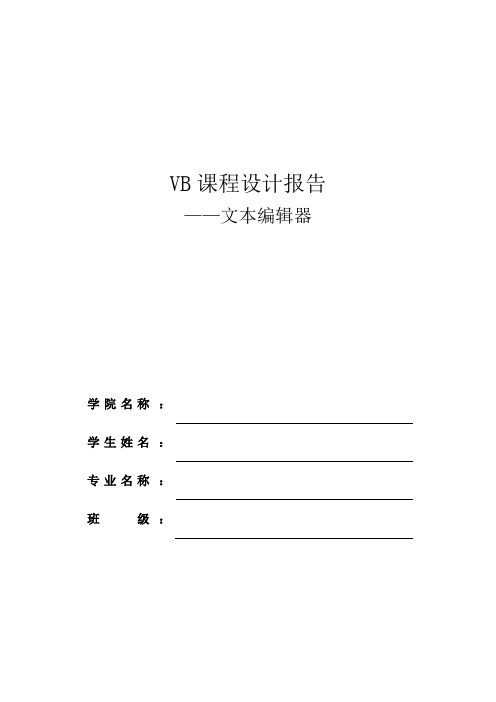
VB课程设计报告——文本编辑器学院名称:学生姓名:专业名称:班级:一、课程设计题目用Visual Basic程序设计语言编写一个简易的文本编辑器要求:有最基本的文本编辑功能,包括复制、剪切、粘贴、字体设置、背景颜色设置、字体颜色设置;同时拥有文本管理功能,包括打开文件、保存文件;以及完整的系统运行退出等功能,所有的操作可选择设定的快捷键。
二、课程设计目的虽然本学期的Visual Basic课程是自学的,相对于课堂学习有些不足,但通过平时的上机实验,初步掌握了VB程序设计的各种方法,学会了编写最基本的VB程序;对于完整的VB程序设计来讲是很不足的,平时掌握的只是单独的窗体(Form)程序编写,以及各种简单控件的使用,没有做到很好连贯性,所以有必要做一次完整的VB程序设计,结合所学的基本知识,使用多个窗体自成一套系统,加上各种控件的综合运用,初步设计一个合格的VB 应用程序;这样在巩固VB所学的同时,更好地学会程序设计的一些思想和方法,对于以后的编程学习或是工作有重要的实践意义。
三、课程设计说明题目为文本编辑器,即是最基本的文本编辑程序,首先必须做好文本编辑器本身的功能,然后对其完善,做成一个完整的小程序功能设计说明:功能是这个文本编辑器的核心内容,也就是程序的作用,它是用来做什么的;本程序就是用来编写文本的,编写过程中要利用到窗体(Form)一个,控件包括:RichTextBox1(超文本框)、CommonDialog(通用对话框),以及InputBox(消息框)、菜单编辑器等,。
要做的工作就是编写代码把这些控件和窗体等结合为一体,使得程序能够成为一体,顺畅运行。
本次设计在按照题目要求的前提下,为了完整地展示一个应用程序,在最初就设计为最基本的文本的编辑器,所以取名为“易记本”,就是简易记事本的简称,然后加入图标,在程序完成之后还进行了大包操作,得到应用程序的安装文件,最后安装在电脑上运行使用。
四.源代码Private Sub Command1_Click()Dim i As IntegerIf Text2.Text <> "123456" Theni = MsgBox("密码错误", 5 + vbExclamation, "警告")If i <> 6 ThenEndElseText2.Text = ""Text2.SetFocusEnd IfEnd IfForm1.HideForm2.ShowEnd SubPrivate Sub Form_Load()Text1.Text = ""Text1.MaxLength = 6Text2.Text = ""Text2.MaxLength = 6Text2.PasswordChar = "*"End SubPrivate Sub Text1_LostFocus()If Not IsNumeric(Text1.Text) Then MsgBox "帐号必须为数字", , "警告" Text1.Text = ""Text1.SetFocusEnd IfEnd SubPrivate Sub Command1_Click()Form2.HideForm3.ShowEnd SubPrivate Sub Command2_Click()Form2.HideForm4.ShowEnd SubPrivate Sub Command3_Click()Form2.HideForm5.ShowEnd SubPrivate Sub Color_Click() CommonDialog1.Action = 3Text1.ForeColor = CommonDialog1.Color End SubPrivate Sub Command1_Click()Form3.HideForm2.ShowEnd SubPrivate Sub Copy_Click()Dim st As Stringst = Text1.SelTextEnd SubPrivate Sub Cut_Click()Dim st As Stringst = Text1.SelTextText1.SelText = ""End SubPrivate Sub Exit_Click()EndEnd SubPrivate Sub Font_Click()CommonDialog1.Flags = cdlCFBoth Or cdlCFEffects CommonDialog1.Action = 4Text1.FontName = CommonDialog1.FileNameText1.FontSize = CommonDialog1.FontSizeText1.FontBold = CommonDialog1.FontBoldText1.FontItalic = CommonDialog1.FontItalicText1.FontStrikethru = CommonDialog1.FontStrikethru Text1.FontUnderline = CommonDialog1.FontUnderline Text1.ForeColor = CommonDialog1.ColorEnd SubSub New_Click()Text1.Text = ""Me.Caption = FileEnd SubSub Open_Click()CommonDialog1.Action = 1Text1.Text = ""Open CommonDialog1.FileName For Input As #1Do While Not EOF(1)Line Input #1, inputdataText1.Text = Text1.Text + inputdata + vbCrLfLoopClose #1End SubPrivate Sub Paste_Click()Text1.SelText = stEnd SubPrivate Sub Print_Click()CommonDialog1.Action = 5For i = 1 To CommonDialog1.CopiesPrinter.Print Text1.TextNext iPrinter.EndDocEnd SubPrivate Sub SaveAs_Click()CommonDialog1.FileName = "vb课设用.txt" CommonDialog1.DefaultExt = "txt"CommonDialog1.Action = 2Open CommonDialog1.FileName For Output As #1 Print #1, Text1.TextEnd SubDim arr As Long, sum As Long, a As IntegerPrivate Sub Command1_Click()a = HScroll1.ValueText1.Text = plus(a)Call isprime(a)End SubPrivate Sub Command2_Click()EndEnd SubPrivate Sub HScroll1_Change()Label2.Caption = HScroll1.ValueEnd SubSub isprime(max As Integer)Dim x As Integer, i As Integer, j As IntegerFor i = 2 To maxx = 0For j = 2 To i - 1If i Mod j = 0 Then x = 1Next jIf x = 0 Then Label2.Caption = Label2.Caption & i & " " Next iEnd SubFunction plus(a As Integer) As LongFor i = 1 To asum = sum + iNext iplus = sumEnd FunctionDim x1 As IntegerDim y1 As IntegerDim x2 As IntegerDim y2 As IntegerDim flag As BooleanPrivate Sub Command1_Click()On Error Resume NextCommonDialog1.CancelError = True CommonDialog1.DialogTitle = "颜色" CommonDialog1.ShowColorIf Err <> 32755 Then Picture1.ForeColor = CommonDialog1.Color End IfEnd SubPrivate Sub Command2_Click()Picture1.ClsEnd SubPrivate Sub Command3_Click()Form5.HideForm6.ShowEnd SubPrivate Sub Option1_Click()Picture1.DrawWidth = 1End SubPrivate Sub Option2_Click()Picture1.DrawWidth = 2End SubPrivate Sub Option3_Click()Picture1.DrawWidth = 4End SubPrivate Sub Option4_Click()Picture1.DrawWidth = 8End SubPrivate Sub Form_Load()Picture1.Scale (0, 0)-(400, 400)flag = FalseEnd SubPrivate Sub Picture1_MouseDown(Button As Integer, Shift As Integer, X As Single, Y As Single) flag = Truex1 = Xy1 = YEnd SubPrivate Sub Picture1_MouseMove(Button As Integer, Shift As Integer, X As Single, Y As Single) If flag = False ThenExit SubEnd IfIf flag = True Thenx2 = Xy2 = YPicture1.Line (x1, y1)-(x2, y2)x1 = x2y1 = y2End IfEnd SubPrivate Sub Picture1_MouseUp(Button As Integer, Shift As Integer, X As Single, Y As Single) flag = FalseEnd SubDim ctP As Single, ctDu() As Single, ctDuS As LongPrivate Sub Command1_Click()Picture1.AutoRedraw = True: ctP = 3.1415926Timer1.Interval = 20: Timer1.Enabled = Not Timer1.EnabledEnd SubPrivate Sub Command2_Click()Form7.HideForm6.ShowEnd SubPrivate Sub Form_Load()Me.Caption = "旋转的椭圆": Command1.Caption = "转/停"Text1.Text = "9 个": Timer1.Enabled = FalseEnd SubPrivate Sub Text1_Change()ctDuS = Val(Text1.Text)If ctDuS > 200 Then Text1.Text = "200"If ctDuS < 1 Then ctDuS = 1ReDim ctDu(0 To ctDuS)End SubPrivate Sub Timer1_Timer()Dim I As LongPicture1.DrawWidth = 3Picture1.ClsFor I = 0 To ctDuSctDu(I) = ctDu(I) + ctP * 0.01 * I / 9If ctDu(I) > ctP * 2 Then ctDu(I) = ctDu(I) - ctP * 2Show1 ctDu(I), &HFFFFFF / (ctDuS + 1) * I * 0.6NextDim x As Single, y As SingleStatic J As SinglePicture1.DrawWidth = 15x0 = Picture1.ScaleWidth * 0.5: y0 = Picture1.ScaleHeight * 0.5 Picture1.PSet (x0, y0), 255x = 1200: y = 0: J = J - 0.05If J < -ctP * 2 Then J = J + ctP * 2Zhuan J, x, yPicture1.PSet (x0 + x, y0 + y), RGB(0, 0, 255)End SubPrivate Sub Show1(ToJ As Single, Se As Long)Dim I As Single, x As Single, y As Single, x0 As Single, y0 As Single Dim a As Single, b As Single, x1 As Single, y1 As SingleIf Picture1.ScaleWidth < Picture1.ScaleHeight Thena = Picture1.ScaleWidth * 0.45Elsea = Picture1.ScaleHeight * 0.45End Ifb = a * 0.25x0 = Picture1.ScaleWidth * 0.5: y0 = Picture1.ScaleHeight * 0.5x = -a: y = 0: Zhuan ToJ, x, yx1 = a: y1 = 0: Zhuan ToJ, x1, y1Picture1.Line (x0 + x, y0 + y)-(x0 + x1, y0 + y1), Sex = 0: y = -b: Zhuan ToJ, x, yx1 = 0: y1 = b: Zhuan ToJ, x1, y1Picture1.Line (x0 + x, y0 + y)-(x0 + x1, y0 + y1), SeFor I = 0 To ctP * 2 Step 0.1x = a * Sin(I): y = b * Cos(I)Zhuan ToJ, x, yPicture1.Line -(x0 + x, y0 + y), SeNextx = a * Sin(I): y = b * Cos(I)Zhuan ToJ, x, yPicture1.Line -(x0 + x, y0 + y), SeEnd SubPrivate Sub Zhuan(ToJ As Single, x As Single, y As Single) Dim S As Single, J As SingleS = Sqr(x ^ 2 + y ^ 2)If S = 0 Then J = 0 Else J = y / SIf Abs(J) >= 1 ThenIf J > 0 Then J = ctP * 0.5 Else J = -ctP * 0.5ElseJ = Atn(J / Sqr(-J * J + 1))End IfIf x < 0 Then J = -ctP - Jx = S * Cos(J + ToJ): y = S * Sin(J + ToJ) End Sub Private Sub Command1_Click()EndEnd Sub五、运行结果六.心得体会通过本次课程设计,使我对VB的认识更加深入了一层,VB主要由两部分组成,一个是Visual 可视化界面设计,另一个是Basic程序设计。
程序编辑的必备工具文本编辑器推荐

程序编辑的必备工具文本编辑器推荐文本编辑器是程序编辑的必备工具之一。
它为程序员提供了一个便捷且高效的环境,用于编辑、调试和管理代码。
在选择适合自己的文本编辑器时,往往需要考虑诸多因素,如界面友好度、功能强大程度、插件扩展性以及跨平台兼容性等。
下面将为大家推荐几款优秀的文本编辑器,帮助程序员提高开发效率。
一、Sublime TextSublime Text是一款强大且流行的文本编辑器,被广大程序员所喜爱。
它提供了简洁的界面和丰富的功能,支持多种编程语言的语法高亮、自动补全和宏命令等。
Sublime Text还支持插件扩展,可以根据个人需求进行定制。
其跨平台特性使得程序员可以在不同操作系统上进行开发,极大地提高了开发效率。
二、Visual Studio CodeVisual Studio Code是由微软推出的一款轻量级代码编辑器,其功能强大、易于使用,并且拥有丰富的插件生态系统。
Visual Studio Code支持多种编程语言,提供了智能代码补全、调试、版本控制等功能,使得程序员能够更加高效地进行开发。
它还具有丰富的主题可供选择,可以个性化编辑器的外观。
三、AtomAtom是GitHub开发的一款开源文本编辑器,被誉为“21世纪的编辑器”。
它具有可定制化的界面、快速的性能和丰富的插件生态系统。
Atom支持多种编程语言,提供了代码片段、文件目录树、项目管理等实用功能。
同时,Atom还具有Git和GitHub的集成,方便程序员进行代码版本管理。
四、Notepad++Notepad++是一款免费的文本编辑器,适用于Windows环境。
尽管它的功能相对较简单,但Notepad++提供了语法高亮、代码折叠、宏命令等功能,足以满足大部分程序员的需求。
在开发小型项目或进行简单的代码编辑时,Notepad++是一个不错的选择。
五、VimVim是一款老牌而强大的文本编辑器,它具有丰富的特性和高度可定制性。
Vim支持多种操作模式和快捷键,让用户能够快速编辑和导航代码。
java实现简易文本编辑器

java实现简易文本编辑器importjava.awt.某; importjava.awt.event.某; importjava 某.wing.某; importjava某.wing.event.某; importjava.util.某; importjava.io.某; importjava某.wing.filechooer.某; importjava某.wing.filechooer.FileFilter; importjava.awt.datatranfer.某; publicclaTe某te某tendJFrame { Te某tAreaarea; Stringname=null; Stringboard=null; privateClipboar dcb; publicTe某t()throwE某ception { etTitle("记事本"); Toolkitkit=Toolkit.getDefaultToolkit(); Imageimg=kit.getIm age("01.jpg"); etIconImage(img); JMenuBarjmb=newJMenuBar(); a dd(jmb); etJMenuBar(jmb); JMenufile=newJMenu("文件"); JMenuedit=newJMenu("编辑"); JMenuItemrebuild=newJMenuItem("新建"); JMenuItemave=newJMenuItem("保存"); JMenuItemopen=newJMenuItem("打开"); JMenuItemanotherSave=newJMenuItem("另存为"); file.add(rebuild); file.add(ave); file.add(open); file.a dd(anotherSave); rebuild.etAccelerator(KeyStroke.getKeyStroke(" ctrlN")); open.etAccelerator(KeyStroke.getKeyStroke("ctrlO")); ave.etAccelerator(KeyStroke.getKeyStroke("ctrlS")); anotherSa ve.etAccelerator(KeyStroke.getKeyStroke("ctrlA")); area=newTe 某tArea(); add(area); //JScrollPanecroldPane=newJScrollPane(area );//设置滚动轴//add(croldPane); ave.addActionLitener(newActionLitener() { publicvoidactionPerformed(ActionEvente) { try{ aveTe某t(); }catch(E某ceptione某) { } } }); open.addActionLitener(newActionLitener() { publicvoidactionPerformed(ActionEvente) { try{ openTe某t(); }catch(E某ceptione某) { } } }); rebuild.addActionLitener(newActionLitener() { publicvoidactionPerformed(ActionEvente) { try{ area.etTe 某t(""); name=null; }catch(E某ceptione某) {} } }); anotherSave.addActionLitener(newActionLitener() { publicvoidactionPerformed(ActionEvente) { anotherSaveTe 某t(); } }); JMenuItemcut=newJMenuItem("剪切"); JMenuItemcopy=newJMenuItem("复制"); JMenuItemplater=newJMenuItem("粘贴"); JMenuItemall=newJMenuItem("全选"); edit.add(cut); edit.add(copy); edit.add(plater); edit.ad d(all); cut.etAccelerator(KeyStroke.getKeyStroke("ctrl某")); copy.etAccelerator(KeyStroke.getKeyStroke("ctrlC")); plat er.etAccelerator(KeyStroke.getKeyStroke("ctrlV")); all.etAccele rator(KeyStroke.getKeyStroke("ctrlA")); cb=Toolkit.getDefaultTo olkit().getSytemClipboard(); cut.addActionLitener(newActionLite ner()//剪切{ publicvoidactionPerformed(ActionEvente) { board=area.ge tSelectedTe某t(); cb.etContent(newStringSelection(board),null); area.replaceRange("",area.ge tSelectionStart(),area.getSelectionEnd()); } }); copy.addActionLitener(newActionLitener()//复制{ publicvoidactionPerformed(ActionEvente) { board=area.getSelectedTe某t(); cb.etContent(newStringSelection(board),null); } }); pla ter.addActionLitener(newActionLitener()//粘贴{ publicvoidactionPerformed(ActionEvente) { try{ Tranfer ablecontent=cb.getContent(null); Stringt=(String)content.getTra nferData(DataFlavor.tringFlavor); area.replaceRange(t,area.getS electionStart(),area.getSelectionEnd()); }catch(E某ceptione 某) {} } }); all.addActionLitener(newActionLitener()//全选{ publicvoidactionPerformed(ActionEvente) { area.etSelect ionStart(0); area.etSelectionEnd(area.getTe某t().length()); } }); JMenuhelp=newJMenu("帮助"); JMenuItemabout=newJMenuItem("关于"); help.add(about); about.addActionLitener(newActionLitener() { publicvoidactionPerformed(ActionEvente) { JFrameframe=new JFrame("关于"); frame.etSize(150,100); frame.etLocation(400,300); JTe某tAreaarea1=newJTe某tArea("制作人:杨杰\n制作时间:2022.8.03"); frame.add(area1); frame.etViible(true); } }); jmb.add(file); jmb.add(edit); jmb.add(help); etSize(600,400);etLocation(300,200); etViible(true); etDefaultCloeOperation( JFrame.E某IT_ON_CLOSE); } publicvoidopenTe某t()//打开{ JFileChooerchooer=newJFileChooer(); FileNameE某tenionFilterfilter=newFileNameE某tenionFilter("File","t某t","java"); chooer.etFileFilter(filter); chooer.etCurrentDirec tory(newFile(".")); intreult=chooer.howOpenDialog(Te某t.thi); if(reult==JFileChooer.APPROVE_OPTION) { name=chooer.g etSelectedFile().getPath(); etTitle(name); try{ BufferedReade rin=newBufferedReader(newFileReader(name)); Stringline=null; S tringdata=""; while((line=in.readLine())!=null) { if(data=="" ) { data=data+line; } ele { data=data+"\n"+line; } } ar ea.etTe某t(data); in.cloe(); }catch(E某ceptione某) { } } } publicvoidaveTe某t()//保存{ if(name==null) { JFileChooerchooer=newJFileChooer(); F ileNameE某tenionFilterfilter=newFileNameE某tenionFilter("File","t某t","java"); chooer.etFileFilter(filter); chooer.etCurrentDirec tory(newFile(".")); intreult=chooer.howSaveDialog(Te某t.thi); if(reult==JFileChooer.APPROVE_OPTION) { name=chooer.g etSelectedFile().getPath(); try{ OutputStreamout=newFileOutput Stream(name); Stringdata=area.getTe某t(); out.write(data.getByte()); out.cloe(); }catch(E某ceptione某) { } } } ele { try{ OutputStreamout=newFileOutputStre am(name); Stringdata=area.getTe某t() ; out.write(data.getByte()); out.cloe(); }catch(E某ceptione某) { } } } publicvoidanotherSaveTe某t()//另存为{ JFileChooerchooer=newJFileChooer(); FileNameE某tenionFilterfilter=newFileNameE某tenionFilter("File","t某t","java"); chooer.etFileFilter(filter); chooer.etCurrentDirec tory(newFile(".")); intreult=chooer.howSaveDialog(Te某t.thi); if(reult==JFileChooer.APPROVE_OPTION) { name=chooer.g etSelectedFile().getPath(); try{ OutputStreamout=newFileOutput Stream(name); Stringdata=area.getTe某t(); out.write( data.getByte()); out.cloe(); }catch(E某ceptione某) { } } } publictaticvoidmain(String[]arg)throwE 某ception { newTe某t(); } }。
代码制作软件有哪些

代码制作软件有哪些在当今的数字化时代,编写和制作代码已经成为许多人工作者和编程爱好者的日常工作。
为了提高生产效率和代码质量,许多开发者依赖于各种代码制作软件。
本文将介绍一些常用的代码制作软件,帮助读者更好地选择适合自己需求的工具。
1. Visual Studio CodeVisual Studio Code(简称VS Code)是一款免费开源的代码编辑器,由微软开发。
它支持多种编程语言,具有强大的代码补全、调试、版本控制等功能。
同时,VS Code还支持丰富的插件系统,可以根据个人需求自定义配置。
2. Sublime TextSublime Text是一款轻量级代码编辑器,拥有快速的代码编辑和跳转功能。
它支持多种编程语言和主题定制,让用户可以根据自己的喜好进行个性化设置。
3. AtomAtom是由GitHub开发的开源文本编辑器,它具有跨平台的特性,支持插件扩展和主题定制。
Atom拥有直观的界面和易用的代码编辑功能,受到许多开发者的青睐。
4. IntelliJ IDEAIntelliJ IDEA是一款专业化的Java开发集成环境(IDE),提供了丰富的功能和工具,包括代码分析、重构、调试等。
IntelliJ IDEA还支持多种插件,适用于Java开发者。
5. EclipseEclipse是一个功能强大的开发工具平台,拥有丰富的插件和扩展功能。
它支持多种编程语言,包括Java、C++、Python等,适用于广泛的开发需求。
6. XcodeXcode是苹果公司开发的集成开发环境(IDE),专门用于开发iOS和Mac应用程序。
Xcode提供了丰富的工具和模拟器,帮助开发者快速创建和调试应用程序。
7. NetBeansNetBeans是一款免费开源的集成开发环境,支持多种编程语言,包括Java、PHP、C++等。
NetBeans具有轻量级的特性和易用的界面,适合初学者和专业开发者使用。
以上是一些常用的代码制作软件,它们各具特色,适合不同类型的开发者和项目需求。
分享10个程序员常用的的代码文本编辑器
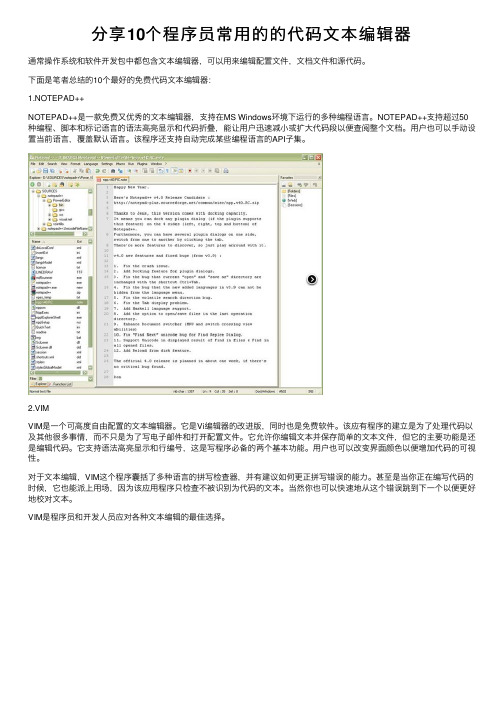
分享10个程序员常⽤的的代码⽂本编辑器通常操作系统和软件开发包中都包含⽂本编辑器,可以⽤来编辑配置⽂件,⽂档⽂件和源代码。
下⾯是笔者总结的10个最好的免费代码⽂本编辑器:1.NOTEPAD++NOTEPAD++是⼀款免费⼜优秀的⽂本编辑器,⽀持在MS Windows环境下运⾏的多种编程语⾔。
NOTEPAD++⽀持超过50种编程、脚本和标记语⾔的语法⾼亮显⽰和代码折叠,能让⽤户迅速减⼩或扩⼤代码段以便查阅整个⽂档。
⽤户也可以⼿动设置当前语⾔,覆盖默认语⾔。
该程序还⽀持⾃动完成某些编程语⾔的API⼦集。
2.VIMVIM是⼀个可⾼度⾃由配置的⽂本编辑器。
它是Vi编辑器的改进版,同时也是免费软件。
该应有程序的建⽴是为了处理代码以及其他很多事情,⽽不只是为了写电⼦邮件和打开配置⽂件。
它允许你编辑⽂本并保存简单的⽂本⽂件,但它的主要功能是还是编辑代码。
它⽀持语法⾼亮显⽰和⾏编号,这是写程序必备的两个基本功能。
⽤户也可以改变界⾯颜⾊以便增加代码的可视性。
对于⽂本编辑,VIM这个程序囊括了多种语⾔的拼写检查器,并有建议如何更正拼写错误的能⼒。
甚⾄是当你正在编写代码的时候,它也能派上⽤场,因为该应⽤程序只检查不被识别为代码的⽂本。
当然你也可以快速地从这个错误跳到下⼀个以便更好地校对⽂本。
VIM是程序员和开发⼈员应对各种⽂本编辑的最佳选择。
3.GNU EmacsEmacs是⼀个可移植、可扩展、免费的⽂本编辑器。
Emacs提供了⼀些命令来管理语句和段落,⾼亮的语法使得源代码更易于阅读,以及“键盘宏”的⽅式来执⾏⽤户定义的编辑命令。
Emacs可以在若⼲个操作系统上运⾏,⽆论你使⽤的是哪⼀种机器类型。
这让程序员⾮常受⽤。
如果你使⽤的是通⽤的编程语⾔,Emacs还会为你提供模式以及相应的排版和布局,更加⽅便你编辑代码。
Emacs或许不是最简单的⼯具,但它绝对是最强⼤的编辑器之⼀。
相⽐vim,Emacs的启动时间更长,所需要的内存也更多。
标准化文件编写工具
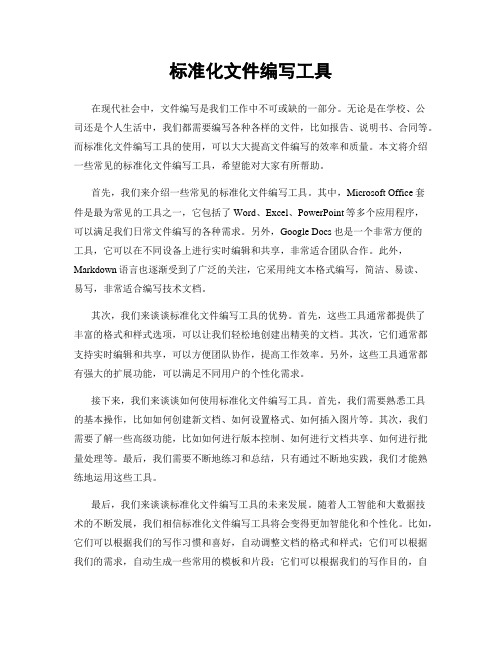
标准化文件编写工具在现代社会中,文件编写是我们工作中不可或缺的一部分。
无论是在学校、公司还是个人生活中,我们都需要编写各种各样的文件,比如报告、说明书、合同等。
而标准化文件编写工具的使用,可以大大提高文件编写的效率和质量。
本文将介绍一些常见的标准化文件编写工具,希望能对大家有所帮助。
首先,我们来介绍一些常见的标准化文件编写工具。
其中,Microsoft Office套件是最为常见的工具之一,它包括了Word、Excel、PowerPoint等多个应用程序,可以满足我们日常文件编写的各种需求。
另外,Google Docs也是一个非常方便的工具,它可以在不同设备上进行实时编辑和共享,非常适合团队合作。
此外,Markdown语言也逐渐受到了广泛的关注,它采用纯文本格式编写,简洁、易读、易写,非常适合编写技术文档。
其次,我们来谈谈标准化文件编写工具的优势。
首先,这些工具通常都提供了丰富的格式和样式选项,可以让我们轻松地创建出精美的文档。
其次,它们通常都支持实时编辑和共享,可以方便团队协作,提高工作效率。
另外,这些工具通常都有强大的扩展功能,可以满足不同用户的个性化需求。
接下来,我们来谈谈如何使用标准化文件编写工具。
首先,我们需要熟悉工具的基本操作,比如如何创建新文档、如何设置格式、如何插入图片等。
其次,我们需要了解一些高级功能,比如如何进行版本控制、如何进行文档共享、如何进行批量处理等。
最后,我们需要不断地练习和总结,只有通过不断地实践,我们才能熟练地运用这些工具。
最后,我们来谈谈标准化文件编写工具的未来发展。
随着人工智能和大数据技术的不断发展,我们相信标准化文件编写工具将会变得更加智能化和个性化。
比如,它们可以根据我们的写作习惯和喜好,自动调整文档的格式和样式;它们可以根据我们的需求,自动生成一些常用的模板和片段;它们可以根据我们的写作目的,自动进行文档内容的推荐和优化。
总之,我们有理由相信,标准化文件编写工具将会变得越来越智能,越来越方便,越来越适合我们的需求。
九款Linux文本编辑器全接触

九款Linux文本编辑器全接触作者:雪影蓝风(编译)出处:天极Yesky软件频道本文对Linux操作系统中的Emacs、KVIM、Arachnophilia、Bluefish、Komodo Edit、NEdit、Gedit、Kate、Quanta Plus九款文本编辑器进行了全面的评测,大家可以从中选择一款适合自己的编辑器……元老级的工具∙EmacsEmacs的标语就是“可扩展、可定制、自文档化的实时显示编辑器。
”要注意的是,在它的口号中,并没有提到“易用”或者是“直观”。
这并不是为那些需要“所见即所得”软件的用户而设的;如果你需要一些像拼写检查这样的写作工具,它也不适合你。
[详细内容]∙KVIM这个编辑器也不是那么直观,在你使用它输入之前,你还是需要阅读一下它的使用说明。
毫无疑问,KVIM可以高度自行配置,并且它很强大,还是可编程序的。
[详细内容]用现代的方式编写代码∙ArachnophiliaArachnophilia似乎并不是为写作和内容编辑而设计,因为它没有拼写检查、词典或者是语法辅助。
它的大多数功能都是为代码编写者而设,包括语义着色、Java和C++编辑,还支持包括对CSS、XML、Java、Perl、PHP、Python和SQL等多种文件类型的支持。
[详细内容]∙BluefishBluefish标榜其自身是“一款为熟练的Web设计员和程序员而设的编辑器”,但它的UI却很直观,任何初学者都很够很快上手,并在不断地积累中发现和掌握它的其它功能。
如果你需要的是一款能够进行Web 代码设计的文本编辑器,那么它一定会是一款很不错的软件。
[详细内容]∙Komodo EditKomodo Edit是ActiveState 295美元的IDE的一个免费版的编辑工具。
它具备了很多程序员需要的文本操作功能,例如定义、加入行、更改大小写字母、注释一段高亮的块以及我最喜欢的跳到匹配的大括号。
[详细内容]∙NEditNEdit看上去似乎更多地是为了那些编写代码的人而设计的,而不是用于编辑文章或者是粗浅的HTML 页面。
五款专业文本编辑器比较

四、用户群推荐
1.如果您想访问其它操作系统编程,可使用UltraEdit32和EditPlus
3.如果您想编写或查看Pascal、汇编、SQL程序,可使用EmEditor和Notpad2
我们参评的软件中只有EmEditor和Notpad2可以高亮显示代码,可使用Notepad2
Notpad2的高亮标记涵盖面最广,不仅各种编程语言,甚至连注册表文件*.reg,批处理文件*.bat,它都可以以各种颜色来清晰地显示。而且Notepad2对各种编码地支持很好,不会出现中文乱码,还可以随时在ANSI、UNICODE、UTF-8间切换。而且这个软件体积如此小巧,功能又是如此简单易用,真的是可以把它当作Notepad的替代品。不过它是单文档界面,只能打开一个文件――这点也与notepad相同。
汉字问题:WinHe显示汉字没有出现乱码问题
WinHex是一款直接、灵巧的修改工具。对它的使用需要我们的汇编等底层开发经验。我们可以用它手工编辑一个exe或dll文件,甚至一个磁盘。甚至可以用WinHex抢救丢失的硬盘数据。
4.EmEditor
EmEditor也是一款不错的文本编辑工具,它的功能没有UltraEdit、EditPlus那样强大。如果你只需要高亮标记、查找替换、录制宏、打开多个文档、选择多个字符集的话,EmEditor也足够用了。简洁是它的特色。
2.可以高亮标记各种编程语言、可以识别多种文字编码。
3.可以有简单编辑功能、连接外部程序、调用DOS命令。
实现一个简单的文本编辑器
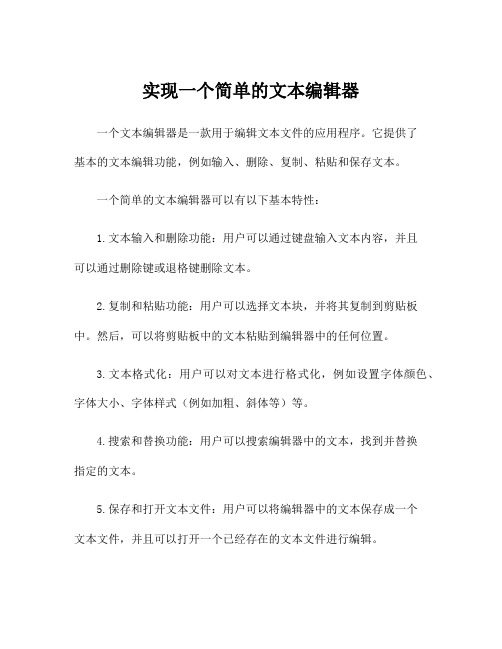
实现一个简单的文本编辑器一个文本编辑器是一款用于编辑文本文件的应用程序。
它提供了基本的文本编辑功能,例如输入、删除、复制、粘贴和保存文本。
一个简单的文本编辑器可以有以下基本特性:1.文本输入和删除功能:用户可以通过键盘输入文本内容,并且可以通过删除键或退格键删除文本。
2.复制和粘贴功能:用户可以选择文本块,并将其复制到剪贴板中。
然后,可以将剪贴板中的文本粘贴到编辑器中的任何位置。
3.文本格式化:用户可以对文本进行格式化,例如设置字体颜色、字体大小、字体样式(例如加粗、斜体等)等。
4.搜索和替换功能:用户可以搜索编辑器中的文本,找到并替换指定的文本。
5.保存和打开文本文件:用户可以将编辑器中的文本保存成一个文本文件,并且可以打开一个已经存在的文本文件进行编辑。
6.撤销和重做功能:用户可以撤销之前的操作,并重做已经撤销的操作。
7.拼写检查和自动纠错功能:编辑器可以检查用户输入的文本中的拼写错误,并根据语言规则自动纠正错误。
8.自动保存:编辑器可以在一定时间间隔内自动保存用户的文件,以防止意外的程序崩溃或电源故障导致数据丢失。
9.多窗口和标签:用户可以同时打开多个编辑器窗口,并在每个窗口中进行不同的编辑。
10.快捷键:编辑器可以提供一些常用功能的快捷键,以方便用户的操作。
11.缩进和对齐:编辑器可以提供自动缩进和对齐功能,以使文本整齐明了。
12.行号和标记:编辑器可以显示行号,并允许用户通过添加标记(例如断点)来快速导航到特定行。
13.支持多种编程语言:编辑器可以针对不同的编程语言提供特定的功能,例如语法高亮、代码折叠等。
当然,上述的特性只是一个简单文本编辑器的基本要求,实际上,现代化的文本编辑器具有更多更强大的功能和特性。
文本编辑器的常用快捷键大全
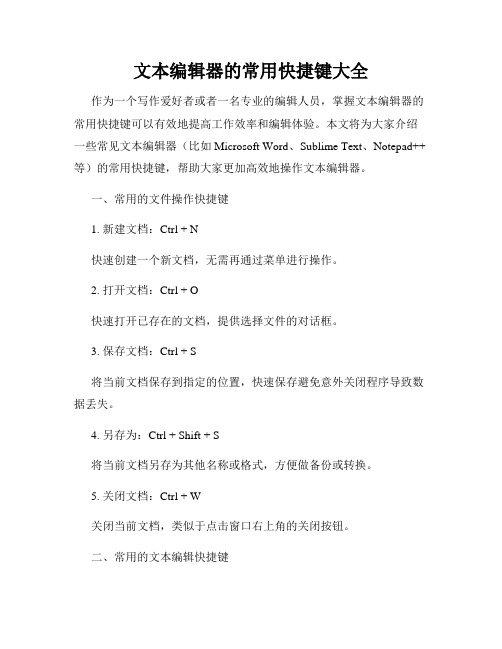
文本编辑器的常用快捷键大全作为一个写作爱好者或者一名专业的编辑人员,掌握文本编辑器的常用快捷键可以有效地提高工作效率和编辑体验。
本文将为大家介绍一些常见文本编辑器(比如Microsoft Word、Sublime Text、Notepad++等)的常用快捷键,帮助大家更加高效地操作文本编辑器。
一、常用的文件操作快捷键1. 新建文档:Ctrl + N快速创建一个新文档,无需再通过菜单进行操作。
2. 打开文档:Ctrl + O快速打开已存在的文档,提供选择文件的对话框。
3. 保存文档:Ctrl + S将当前文档保存到指定的位置,快速保存避免意外关闭程序导致数据丢失。
4. 另存为:Ctrl + Shift + S将当前文档另存为其他名称或格式,方便做备份或转换。
5. 关闭文档:Ctrl + W关闭当前文档,类似于点击窗口右上角的关闭按钮。
二、常用的文本编辑快捷键1. 复制:Ctrl + C将选中的文本内容复制到剪贴板,可用于粘贴到其他地方。
2. 剪切:Ctrl + X将选中的文本内容剪切到剪贴板,同时删除选中内容。
3. 粘贴:Ctrl + V将剪贴板中的内容粘贴到光标位置。
4. 撤销:Ctrl + Z撤销最近的编辑操作,恢复到上一步操作前的状态。
5. 重做:Ctrl + Y重做上一次被撤销的操作,恢复到上一步操作后的状态。
6. 全选:Ctrl + A选中整个文档中的所有内容。
7. 查找和替换:Ctrl + F打开查找和替换对话框,方便搜索指定内容并进行替换操作。
8. 删除整行:Ctrl + D删除光标所在行的所有内容。
9. 撤销选择:Esc取消当前的选中状态,或者取消正在进行的操作。
10. 块选择:Ctrl + Shift + 方向键按住Ctrl + Shift键,在文本中进行块选择,方便按列选择或编辑。
三、辅助功能快捷键1. 撤销全部选中:Ctrl + Shift + L将当前选中的单词全部反选,可用于同时修改多处相同单词。
C语言实现简易文本编辑器
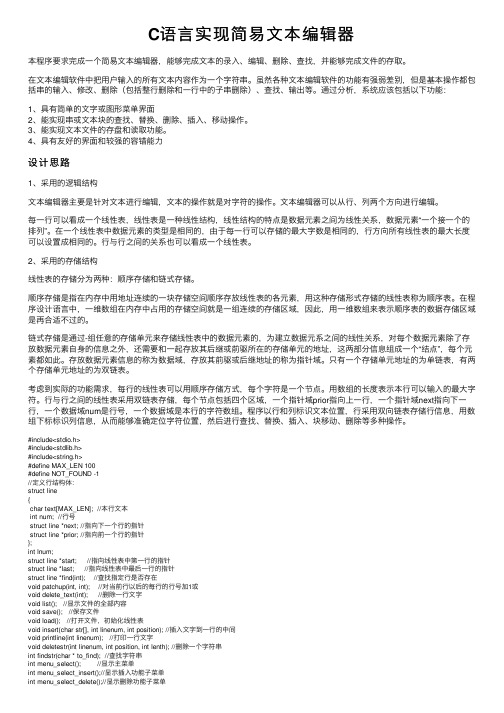
C语⾔实现简易⽂本编辑器本程序要求完成⼀个简易⽂本编辑器,能够完成⽂本的录⼊、编辑、删除、查找,并能够完成⽂件的存取。
在⽂本编辑软件中把⽤户输⼊的所有⽂本内容作为⼀个字符串。
虽然各种⽂本编辑软件的功能有强弱差别,但是基本操作都包括串的输⼊、修改、删除(包括整⾏删除和⼀⾏中的⼦串删除)、查找、输出等。
通过分析,系统应该包括以下功能:1、具有简单的⽂字或图形菜单界⾯2、能实现串或⽂本块的查找、替换、删除、插⼊、移动操作。
3、能实现⽂本⽂件的存盘和读取功能。
4、具有友好的界⾯和较强的容错能⼒设计思路1、采⽤的逻辑结构⽂本编辑器主要是针对⽂本进⾏编辑,⽂本的操作就是对字符的操作。
⽂本编辑器可以从⾏、列两个⽅向进⾏编辑。
每⼀⾏可以看成⼀个线性表,线性表是⼀种线性结构,线性结构的特点是数据元素之间为线性关系,数据元素“⼀个接⼀个的排列”。
在⼀个线性表中数据元素的类型是相同的,由于每⼀⾏可以存储的最⼤字数是相同的,⾏⽅向所有线性表的最⼤长度可以设置成相同的。
⾏与⾏之间的关系也可以看成⼀个线性表。
2、采⽤的存储结构线性表的存储分为两种:顺序存储和链式存储。
顺序存储是指在内存中⽤地址连续的⼀块存储空间顺序存放线性表的各元素,⽤这种存储形式存储的线性表称为顺序表。
在程序设计语⾔中,⼀维数组在内存中占⽤的存储空间就是⼀组连续的存储区域,因此,⽤⼀维数组来表⽰顺序表的数据存储区域是再合适不过的。
链式存储是通过-组任意的存储单元来存储线性表中的数据元素的,为建⽴数据元系之间的线性关系,对每个数据元素除了存放数据元素⾃⾝的信息之外,还需要和⼀起存放其后继或前驱所在的存储单元的地址,这两部分信息组成⼀个“结点”,每个元素都如此。
存放数据元素信息的称为数据域,存放其前驱或后继地址的称为指针域。
只有⼀个存储单元地址的为单链表,有两个存储单元地址的为双链表。
考虑到实际的功能需求,每⾏的线性表可以⽤顺序存储⽅式,每个字符是⼀个节点。
27款优秀的文本编辑器

27款优秀的⽂本编辑器经常跟代码打交道的⼈,除了⾃⼰所掌握的代码知识之外,我想他们最需要的⼯具之⼀,应该是⼀款得意的⽂本编辑器了。
好的⽂本编辑器⼀般都⽀持语法⾼亮功能,⽀持多语⾔,⽂件⽐较、插件、代码⽚断助⼿、预览以及FTP管理。
⼀些编辑器甚⾄为⼀个完全的开发环境提供了全⾯的功能和特性。
这⾥是我收集的27款免费的⽐较优秀的⽂本编辑器,适⽤在Windows,Mac或Linux等操作系统环境下⼯作,其中有些还可同时兼容多个操作系统。
Notepad++Notepad++ 是⼀款很有特⾊的⽂本编辑器:1、内置⽀持27 种语法⾼亮度显⽰,⽀持⾃定义语⾔;2、可⾃动检测⽂件类型,根据关键字显⽰节点,节点可⾃由折叠/打开;3、可同时打开两个窗⼝,在分窗⼝中⼜可打开多个⼦窗⼝,允许快捷切换全屏显⽰模式(F11),⽀持⿏标滚轮改变⽂档显⽰⽐例;4、其他特点包括:邻⾏互换位置、宏功能等等。
⼯作环境:WindowsBBEditBBEdit是全球领先的专业HTML和⽂本编辑器,功能包括grep图样匹配,搜索和替换多个⽂件,项⽬定义,功能导航和众多的源代码语⾔的语法着⾊,⽀持代码折叠,FTP和SFTP打开和保存等。
⼯作环境:Mac OS。
Boxer Text EditorEditra是⼀个⽀持多平台的⽂本编辑器,可以⽀持基本语法和⼆⼗种语⾔。
它使⽤⽅便,可以⽤颜⾊标注重点部分,⽀持进⾏内嵌式编辑,也可以进⾏代码编辑。
emacsEmacs不仅仅是⼀个编辑器,他是⼀个整合环境,或可称它为集成开发环境,这些功能如让使⽤者置⾝于全功能的操作系统中。
能够在当前⼤多数操作系统上运⾏,包括类Unix系统、MS-DOS、Microsoft Windows以及OpenVMS等。
Emacs既可以在⽂本终端也可以在图形⽤户界⾯(GUI)环境下运⾏。
FraiseFraise是⼀款免费专门为MacOSX10.6开发的⽂本编辑器,并且⾮常易⽤和强⼤。
Web程序员常用的15个源代码编辑器
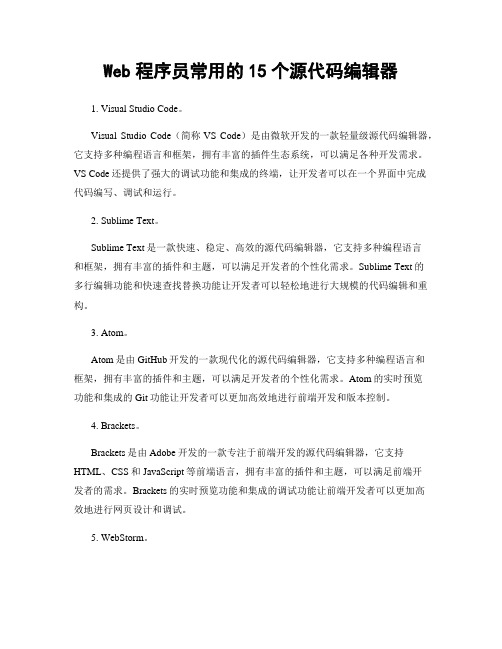
Web程序员常用的15个源代码编辑器1. Visual Studio Code。
Visual Studio Code(简称VS Code)是由微软开发的一款轻量级源代码编辑器,它支持多种编程语言和框架,拥有丰富的插件生态系统,可以满足各种开发需求。
VS Code还提供了强大的调试功能和集成的终端,让开发者可以在一个界面中完成代码编写、调试和运行。
2. Sublime Text。
Sublime Text是一款快速、稳定、高效的源代码编辑器,它支持多种编程语言和框架,拥有丰富的插件和主题,可以满足开发者的个性化需求。
Sublime Text的多行编辑功能和快速查找替换功能让开发者可以轻松地进行大规模的代码编辑和重构。
3. Atom。
Atom是由GitHub开发的一款现代化的源代码编辑器,它支持多种编程语言和框架,拥有丰富的插件和主题,可以满足开发者的个性化需求。
Atom的实时预览功能和集成的Git功能让开发者可以更加高效地进行前端开发和版本控制。
4. Brackets。
Brackets是由Adobe开发的一款专注于前端开发的源代码编辑器,它支持HTML、CSS和JavaScript等前端语言,拥有丰富的插件和主题,可以满足前端开发者的需求。
Brackets的实时预览功能和集成的调试功能让前端开发者可以更加高效地进行网页设计和调试。
5. WebStorm。
WebStorm是由JetBrains开发的一款专注于Web开发的集成开发环境(IDE),它支持多种Web开发语言和框架,拥有丰富的功能和插件,可以满足Web开发者的需求。
WebStorm的智能代码补全和强大的调试功能让开发者可以更加高效地进行Web开发和调试。
6. Notepad++。
Notepad++是一款轻量级、快速、稳定的源代码编辑器,它支持多种编程语言和框架,拥有丰富的插件和主题,可以满足开发者的个性化需求。
Notepad++的多标签编辑功能和语法高亮功能让开发者可以更加高效地进行代码编写和查看。
几款在线文本编辑器的比较(jquery文本编辑器) 好学网 vhaoxue

1.FCKeditor他怎么样,我就不用多说了,网上多的很,不过有近300K的体积~~~2.xheditor这个控件好象用的人比较少,不过看起来感觉不错!JS+CSS+图片一共有50K,小啊,中文!3.tinyMCE网上的评价很高,值得一试,不过比较大,近200K了,中文!4.xinha网上的评价也很高,值得一试,不过体积也有120多K~~~5.CuteEditor据说CSDN用的是这个,收费的,不过有破解的版本.呵呵6.kindeditor美化的不错,有兴趣可以玩一玩,很好用,70~80K的样子,有中文语言!7.HTMLArea功能都大同小异的,可以试一试8.Cross-Browser Rich Text Editor很小,全部体积不超过40K,可以试一试9.SinaEditor新浪编辑器应该算是最贴近网友体验的编辑器,简洁、大方,并且使用方便、功能强大。
不过体积嘛,自己去看吧~~以下是我觉得一般的(个人感觉哈!)1.InnovaStudio WYSIWYG Editor要收费2.eWebEditor国人制作,收费的3.jwysiwyg虽然小,但不好用4.WYMeditor样式不好看,个人不喜欢~~5.openWYSIWYG样式不好看,有近100K6.Free Rich Text Editor相当不好用,连加个表格都是用专门的html页面,维护太复杂了7.MarkitUp无法"所见即所得"总结:我所认为值得一用的编辑器,一般都有完整的帮助文档,有社区在持续开发,最近有更新,在使用上方便灵活,支持多种定义方式,能所见即所得,在编码上安全与快捷,程序界面支持中文,界面风格比较漂亮,功能完整.如果想选择功能强大,流行的,可以选FCKeditor与tinyMCE,但代价为体积较大,在性能上值得考虑一下,如果功能要求不是很高,或者对性能有需求,则可以选择xheditor或者kindeditor,当然还有更小的,比如jwysiwyg或Damn Small Rich Text Editor ,但使用上很不方便,得不偿失.PS:如果有代码着色的需求,可以使用一个jquery的插件:highlighter,它对highlighter的非jquery版本做了一定的封装,使用非常方便!引用来源:/sxwlty/blog/item/dc5cc30942e78a2e6b60fbb6.htmljwysiwygWYSIWYG jQuery插件。
几种常用网页文本编辑器总结
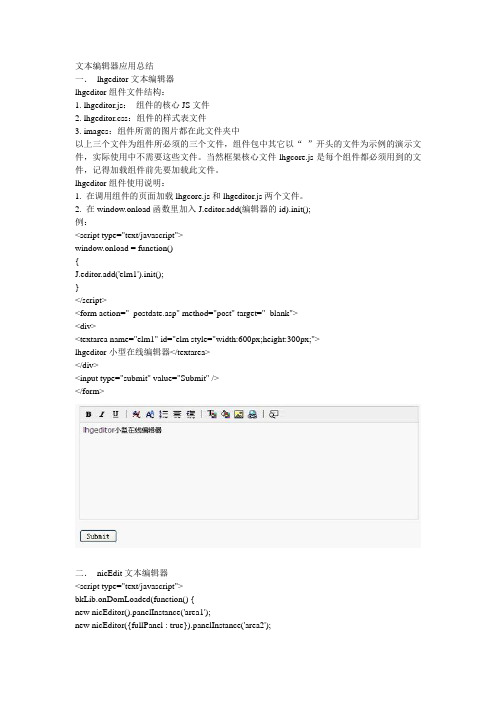
文本编辑器应用总结一.lhgeditor文本编辑器lhgeditor组件文件结构:1. lhgeditor.js:组件的核心JS文件2. lhgeditor.css:组件的样式表文件3. images:组件所需的图片都在此文件夹中以上三个文件为组件所必须的三个文件,组件包中其它以“_”开头的文件为示例的演示文件,实际使用中不需要这些文件。
当然框架核心文件lhgcore.js是每个组件都必须用到的文件,记得加载组件前先要加载此文件。
lhgeditor组件使用说明:1. 在调用组件的页面加载lhgcore.j s和lhgeditor.js两个文件。
2. 在window.onload函数里加入J.editor.add(编辑器的id).init();例:<script type="text/javascript">window.onload = function(){J.editor.add('elm1').init();}</script><form action="_postdate.asp" method="post" target="_blank"><div><textarea name="elm1" id="elm style="width:600px;height:300px;">lhgeditor小型在线编辑器</textarea></div><input type="submit" value="Submit" /></form>二.nicEdit文本编辑器<script type="text/javascript">bkLib.onDomLoaded(function() {new nicEditor().panelInstance('area1');new nicEditor({fullPanel : true}).panelInstance('area2');new nicEditor({iconsPath : '../nicEditorIcons.gif'}).panelInstance('area3');new nicEditor({buttonList :['fontSize','bold','italic','underline','strikeThrough','subscript',' superscript','html','image']}).panelInstance('area4');new nicEditor({maxHeight : 100}).panelInstance('area5');});</script>//默认模式//new nicEditor().panelInstance('area1');<textarea cols="50" id="area1"></textarea>//All A vailable Buttons//new nicEditor({fullPanel : true}).panelInstance('area2');<textarea cols="60" id="area2">Some Initial Content was in this textarea</textarea>//new nicEditor({iconsPath : '../nicEditorIcons.gif'}).panelInstance('area3');<textarea cols="50" id="area3"></textarea>//自定义按钮//new nicEditor({buttonList :['fontSize','bold','italic','underline','strikeThrough','subscript','superscript','html','image']}).panelInstance('area4');<textarea cols="50" id="area4">HTML <b>content</b> <i>default</i> in textarea</textarea>//设置文本编辑器的最大高度//new nicEditor({maxHeight : 100}).panelInstance('area5');<textarea style="height: 100px;" cols="50" id="area5">HTML <b>content</b> <i>default</i> in textarea</textarea>三.kindeditor文本编辑器(1) 支持多种语言php、asp(2) 功能强大默认模式<script charset="utf-8" src="../kindeditor-min.js"></script><script charset="utf-8" src="../lang/zh_CN.js"></script><script>var editor;KindEditor.ready(function(K) {editor = K.create('textarea[name="content"]', {resizeType : 1,allowPreviewEmoticons : false,allowImageUpload : false,items : ['fontname', 'fontsize', '|', 'forecolor', 'hilitecolor', 'bold', 'italic','underline','removeformat', '|', 'justifyleft','justifycenter', 'justifyright', 'insertorderedlist','insertunorderedlist', '|', 'emoticons', 'image', 'link']});});</script><textarea name="content" style="width:700px;height:200px;visibility:hidden;">KindEditor</textarea>Multi Language Examples(多语言)<script charset="utf-8" src="../kindeditor-min.js"></script><script>var editor;KindEditor.ready(function(K) {K('select[name=lang]').change(function() {if (editor) {editor.remove();editor = null;}editor = K.create('textarea[name="content"]', {langType : this.value});});K('select[name=lang]').change();});</script><form><p><select name="lang"><option value="en">English</option><option value="zh_CN">简体中文</option><option value="zh_TW">繁體中文</option><option value="ar">Arabic</option></select></p><textarea name="content" style="width:800px;height:200px;"></textarea> </form>粘贴设置:<script charset="utf-8" src="../kindeditor-min.js"></script><script charset="utf-8" src="../lang/zh_CN.js"></script><script>KindEditor.ready(function(K) {K.create('#content1', {pasteType : 0});K.create('#content2', {pasteType : 1});K.create('#content3', {pasteType : 2});});</script>禁止粘贴<textarea id="content1" name="content" style="width:700px;height:200px; visibility:hidden;"></textarea>纯文本粘贴<textarea id="content2" name="content" style="width:700px;height:200px; visibility:hidden;"></textarea>HTML粘贴<textarea id="content3" name="content" style="width:700px;height:200px; visibility:hidden;"></textarea>自定义插件<script charset="utf-8" src="../kindeditor-min.js"></script> <script charset="utf-8" src="../lang/zh_CN.js"></script> <script>// 自定义插件#1ng({example1 : '插入HTML'});KindEditor.plugin('example1', function(K) {var self = this, name = 'example1';self.clickToolbar(name, function() {self.insertHtml('<strong>测试内容</strong>');});});// 自定义插件#2ng({example2 : 'CLASS样式'});KindEditor.plugin('example2', function(K) {var self = this, name = 'example2';function click(value) {var cmd = self.cmd;if (value === 'adv_strikethrough') {cmd.wrap('<span style="background-color:#e53333;text-decoration:line-through;"></span>');} else {cmd.wrap('<span class="' + value + '"></span>');}cmd.select();self.hideMenu();}self.clickToolbar(name, function() {var menu = self.createMenu({name : name,width : 150});menu.addItem({title : '红底白字',click : function() {click('red');}});menu.addItem({title : '绿底白字',click : function() {click('green');}});menu.addItem({title : '黄底白字',click : function() {click('yellow');}});menu.addItem({title : '自定义删除线',click : function() {click('adv_strikethrough');}});});});KindEditor.ready(function(K) {K.create('#content1', {cssPath : ['../plugins/code/prettify.css', 'index.css'],items : ['source', 'removeformat', 'example1', 'example2', 'code']});});</script><textarea id="content1" name="content" style="width:700px;height:200px; visibility:hidden;"></textarea>单独调用组件上传图片弹出框<script src="../kindeditor.js"></script><script src="../lang/zh_CN.js"></script><script>KindEditor.ready(function(K) {var editor = K.editor({allowFileManager : true});K('#image').click(function() {editor.loadPlugin('image', function() {editor.plugin.imageDialog({imageUrl : K('#url').val(),clickFn : function(url, title, width, height, border, align) {K('#url').val(url);editor.hideDialog();}});});});});</script><input type="text" id="url" value="" /> <input type="button" id="image" value="选择图片" />取色器<script src="../kindeditor-min.js"></script><script>KindEditor.ready(function(K) {var colorpicker;K('#colorpicker').bind('click', function(e) {if (colorpicker) {colorpicker.remove();colorpicker = null;}var colorpickerPos = K('#colorpicker').pos();colorpicker = K.colorpicker({x : colorpickerPos.x,y : colorpickerPos.y + K('#colorpicker').height(),z : 19811214,selectedColor : 'default',noColor : '无颜色',click : function(color) {K('#color').val(color);colorpicker.remove();colorpicker = null;}});});});</script><input type="text" id="color" value="" /> <input type="button" id="colorpicker" value="打开取色器" />四.jsp基本编辑器使用步骤:1.把edit.htm 修改为edit.jsp2.把想要使用的地方包含edit.jsp就行了代码:<!--富文本编辑器--><%@ include file="edit.jsp"%>注意事项:在需要引入编辑器的页面中的onload事件,要结合edit.jsp中的事件五.Xheditor(1) 解压压缩文件,将其中的xheditor-zh-cn.min.js以及xheditor_emot、xheditor_plugins和xheditor_skin三个文件夹上传到网站相应目录注:如果您网站中没有使用jQuery框架,也请一并上传jquery文件夹中的jquery-1.4.4.min.js (2) 在相应html文件的</head>之前添加<script type="text/javascript" src="/js/jquery.js"></script><script type="text/javascript" src="/js/xheditor.js"></script>注:如果jQuery之前已经在项目页面中使用,请勿重复添加引用代码(3).方法1:在textarea上添加属性:class="xheditor"例如:<textarea name="content" class="xheditor">test</textarea>方法2:在您的页面初始JS代码里加上:$('#elm1').xheditor();$('#elm1').xheditor();例如:$({$('#elm1').xheditor();});相应的卸载编辑器的代码为$('#elm1').xheditor(false);例:自定义按钮<script type="text/javascript" src="../jquery/jquery-1.4.4.min.js"></script><script type="text/javascript" src="../xheditor-1.1.12-zh-cn.min.js"></script><script type="text/javascript">$(pageInit);function pageInit(){$.extend(xheditor.settings,{shortcuts:{'ctrl+enter':submitForm}});$('#elm1').xheditor({tools:'full'});$('#elm2').xheditor({tools:'mfull'});$('#elm3').xheditor({tools:'simple'});$('#elm4').xheditor({tools:'mini'});$('#elm5').xheditor({tools:'Cut,Copy,Paste,Pastetext,|,Source,Fullscreen,About'});$('#elm6').xheditor({tools:'Cut,Copy,Paste,Pastetext,/,Source,Fullscreen,About'});}function submitForm(){$('#frmDemo').submit();}</script>1,full(完全):<br /><textarea id="elm1" name="elm1" rows="8" cols="80" style="width: 40%">当前实例调用的Javascript源代码为:</textarea>2,mfull(多行完全):<br /><textarea id="elm2" name="elm2" rows="8" cols="80" style="width: 40%"> 当前实例调用的Javascript源代码为:</textarea>3,simple(简单):<br /><textarea id="elm3" name="elm3" rows="8" cols="80" style="width: 40%">当前实例调用的Javascript源代码为:</textarea>4,mini(迷你):<br /><textarea id="elm4" name="elm4" rows="8" cols="80" style="width: 40%"> 当前实例调用的Javascript源代码为:</textarea>5,custom(自定义):<br /><textarea id="elm5" name="elm5" rows="8" cols="80" style="width: 40%">当前实例调用的Javascript源代码为:</textarea>6,自定义多行模式:<br /><textarea id="elm6" name="elm6" rows="8" cols="80" style="width: 40%">当前实例调用的Javascript源代码为</textarea>皮肤选择注:为了保持项目精简,同一个页面只能调用一个皮肤,当同一界面同时调用多个皮肤时,最后一个皮肤的按钮面板样式会影响之前的<script type="text/javascript" src="../jquery/jquery-1.4.4.min.js"></script><script type="text/javascript" src="../xheditor-1.1.12-zh-cn.min.js"></script><script type="text/javascript">$(pageInit);function pageInit(){$.extend(xheditor.settings,{shortcuts:{'ctrl+enter':submitForm}});$('#elm1').xheditor({skin:'default'});$('#elm2').xheditor({skin:'o2007blue'});$('#elm3').xheditor({skin:'o2007silver'});$('#elm4').xheditor({skin:'vista'});$('#elm5').xheditor({skin:'nostyle'});}function submitForm(){$('#frmDemo').submit();}</script>1,默认皮肤:<br/><textarea id="elm1" name="elm1" rows="8" cols="80" style="width: 40%">当前实例调用的Javascript源代码为:</textarea>2,Office 2007 蓝色:<br /><textarea id="elm2" name="elm2" rows="8" cols="80" style="width: 40%">当前实例调用的Javascript源代码为:</textarea>3,Office 2007 银白色:<br /><textarea id="elm3" name="elm3" rows="8" cols="80" style="width: 40%">当前实例调用的Javascript源代码为</textarea>4,Vista:<br /><textarea id="elm4" name="elm4" rows="8" cols="80" style="width: 40%">当前实例调用的Javascript源代码为</textarea>5,NoStyle:<br /><textarea id="elm5" name="elm5" rows="8" cols="80" style="width: 40%">当前实例调用的Javascript源代码为</textarea>六.Tinymce使用:tinyMCE.init({mode : "textareas",theme : "simple" //模式skin : "o2k7",//word});默认模式<script type="text/javascript" src="../jscripts/tiny_mce/tiny_mce.js"></script> <script type="text/javascript">tinyMCE.init({mode : "textareas",theme : "simple"});</script><textarea id="elm1" name="elm1" rows="8" cols="80" style="width: 40%">This is some example text that you can edit inside the <strong>TinyMCE editor</textarea>皮肤设置<script type="text/javascript" src="../jscripts/tiny_mce/tiny_mce.js"></script><script type="text/javascript">tinyMCE.init({// General optionsmode : "exact",elements : "elm1",theme : "advanced",plugins :"autolink,lists,pagebreak,style,layer,table,save,advhr,advimage,advlink,emotions,iespell,insertdatetime,preview,media,searchreple,print,contextmenu,paste,directionality,fullscreen,noneditable,visualchars,nonbreaking,xhtmlxtras,template,inlinepopups,autosa",// Theme optionstheme_advanced_buttons1 : "save,newdocument,|,bold,italic,underline,strikethrough,|, justifyleft,justifycenter,justifyright,justifyfull,styleselect,formatselect,fontselect,fontsizeselect",theme_advanced_buttons2 : "cut,copy,paste,pastetext,pasteword,|,search,replace,|,bullist, numlist,|,outdent,indent,blockquote,|,undo,redo,|,link,unlink,anchor,image,cleanup,help,code,|,insertdate,inserttime,prevw, |,forecolor,backcolor", theme_advanced_buttons3 : "tablecontrols,|,hr,removeformat,visualaid,|,sub,sup,|, charmap,emotions,iespell,media,advhr,|,print,|,ltr,rtl,|,fullsc",theme_advanced_buttons4 : "insertlayer,moveforward,movebackward,absolute,|, styleprops,|,cite,abbr,acronym,del,ins,attribs,|,visualchars,no,template,pagebreak,restoredraft",theme_advanced_toolbar_location : "top",//工具栏位置theme_advanced_toolbar_align : "left",//工具栏对齐方式theme_advanced_statusbar_location : "bottom",//状态显示栏的位置theme_advanced_resizing : true,// Example content CSS (should be your site CSS)content_css : "css/content.css",// Drop lists for link/image/media/template dialogstemplate_external_list_url : "lists/template_list.js",external_link_list_url : "lists/link_list.js",external_image_list_url : "lists/image_list.js",media_external_list_url : "lists/media_list.js",// Replace values for the template plugintemplate_replace_values : {username : "Some User",staffid : "991234"}});</scritp><textarea id="elm1" name="elm1" rows="8" cols="80" style="width: 40%"><script type="text/javascript" src="../jscripts/tiny_mce/tiny_mce.js"></script><script type="text/javascript">// O2k7 skintinyMCE.init({// General optionsmode : "exact",elements : "elm2",theme : "advanced",skin : "o2k7",plugins : "lists,pagebreak,style,layer,table,save,advhr,advimage,advlink, emotions,iespell,insertdatetime,preview,media,searchreplace,print,contextmenu,paste,directionality,fullscreen,noneditable,visualchars,nonbreg, xhtmlxtras,template,inlinepopups,autosave",// Theme optionstheme_advanced_buttons1 : "save,newdocument,|,bold,italic,underline,strikethrough,|, justifyleft,justifycenter,justifyright,justifyfull,styleselect,formatselect,fontselect,fontsizeselect",theme_advanced_buttons2 : "cut,copy,paste,pastetext,pasteword,|,search,replace,|,bullist,numlist,|,outdent,indent,blockquote,|,undo,redo,|,link,unlink,anchor,image,cleanup,help,code,|,insertdate,inserttime, preview,|,forecolor,backcolor", theme_advanced_buttons3 : "tablecontrols,|,hr,removeformat,visualaid,|,sub,sup,|, charmap,emotions,iespell,media,advhr,|,print,|,ltr,rtl,|,fullsc",theme_advanced_buttons4 : "insertlayer,moveforward,movebackward,absolute,|, styleprops,|,cite,abbr,acronym,del,ins,attribs,|,visualchars,nonbreaking,template,pagebreak,restoredraft",theme_advanced_toolbar_location : "top",theme_advanced_toolbar_align : "left",theme_advanced_statusbar_location : "bottom",theme_advanced_resizing : true,// Example content CSS (should be your site CSS)content_css : "css/content.css",// Drop lists for link/image/media/template dialogstemplate_external_list_url : "lists/template_list.js",external_link_list_url : "lists/link_list.js",external_image_list_url : "lists/image_list.js",media_external_list_url : "lists/media_list.js",// Replace values for the template plugintemplate_replace_values : {username : "Some User",staffid : "991234"}});</script><textarea id="elm2" name="elm2" rows="8" cols="80" style="width: 40%">This is some example text that you can edit inside the <strong>TinyMCE editor;.</textarea><script type="text/javascript" src="../jscripts/tiny_mce/tiny_mce.js"></script><script type="text/javascript">// O2k7 skin (silver)tinyMCE.init({// General optionsmode : "exact",elements : "elm3",theme : "advanced",skin : "o2k7",skin_variant : "silver",plugins : "lists,pagebreak,style,layer,table,save,advhr,advimage,advlink,emotions,iespell,insertdatetime,preview,media,searchreplace,print,contextmenu,paste,directionality,fullscreen,noneditable,visualchars,nonbreaking,xhtmlxtras,template,inlinepopups,autosave",// Theme optionstheme_advanced_buttons1 : "save,newdocument,|,bold,italic,underline,strikethrough,|,justifyleft,justifycenter,justifyright,justifyfull,styleselect, formatselect,fontselect,fontsizeselect", theme_advanced_buttons2 : "cut,copy,paste,pastetext,pasteword,|,search,replace,|,bullist,numlist,|,outdent,indent,blockquote,|,undo,redo,|,link,unlink,anchor,image,cleanup,help,code,|,insertdate,inserttime,preview,|,forecolor,backcolor",theme_advanced_buttons3 : "tablecontrols,|,hr,removeformat,visualaid,|,sub,sup,|,charmap,emotions,iespell,media,advhr,|,print,|, ltr,rtl,|,fullscreen",theme_advanced_buttons4 : "insertlayer,moveforward,movebackward,absolute,|, styleprops,|,cite,abbr,acronym,del,ins,attribs,|,visualchas,nonbreaking,template,pagebreak,restoredraft",theme_advanced_toolbar_location : "top",theme_advanced_toolbar_align : "left",theme_advanced_statusbar_location : "bottom",theme_advanced_resizing : true,// Example content CSS (should be your site CSS)content_css : "css/content.css",// Drop lists for link/image/media/template dialogstemplate_external_list_url : "lists/template_list.js",external_link_list_url : "lists/link_list.js",external_image_list_url : "lists/image_list.js",media_external_list_url : "lists/media_list.js",// Replace values for the template plugintemplate_replace_values : {username : "Some User",staffid : "991234"}});</script><textarea id="elm3" name="elm3" rows="8" cols="80" style="width: 40%">This is some example text that you can edit inside the <strong>TinyMCE</textarea><script type="text/javascript" src="../jscripts/tiny_mce/tiny_mce.js"></script><script type="text/javascript">// O2k7 skin (silver)tinyMCE.init({// General optionsmode : "exact",elements : "elm4",theme : "advanced",skin : "o2k7",skin_variant : "black",plugins : "lists,pagebreak,style,layer,table,save,advhr,advimage,advlink,emotions,iespell,insertdatetime,preview,media,searchreplace,print,contextmenu,paste,directionality,fullscreen,noneditable,visualchars,nonbreaking,xhtmlxtras,template,inlinepopups,autosave",// Theme optionstheme_advanced_buttons1 : "save,newdocument,|,bold,italic,underline,strikethrough,|,justifyleft,justifycenter,justifyright,justifyfull,styleselect, formatselect,fontselect,fontsizeselect", theme_advanced_buttons2 : "cut,copy,paste,pastetext,pasteword,|,search,replace,|,bullist,numlist,|,outdent,indent,blockquote,|,undo,redo,|,link,unlink,anchor,image,cleanup,help,code,|,insertdate,inserttime,preview,|,forecolor,backcolor",theme_advanced_buttons3 : "tablecontrols,|,hr,removeformat,visualaid,|,sub,sup,|,charmap,emotions,iespell,media,advhr,|,print,|, ltr,rtl,|,fullscreen",theme_advanced_buttons4 : "insertlayer,moveforward,movebackward,absolute,|,styleprops,|,cite,abbr,acronym,del,ins,attribs,|,visualchars,nonbreaking,template,pagebreak,restoredraft",theme_advanced_toolbar_location : "top",theme_advanced_toolbar_align : "left",theme_advanced_statusbar_location : "bottom",theme_advanced_resizing : true,// Example content CSS (should be your site CSS)content_css : "css/content.css",// Drop lists for link/image/media/template dialogstemplate_external_list_url : "lists/template_list.js",external_link_list_url : "lists/link_list.js",external_image_list_url : "lists/image_list.js",media_external_list_url : "lists/media_list.js",// Replace values for the template plugintemplate_replace_values : {username : "Some User",staffid : "991234"}});</script><textarea id="elm4" name="elm4" rows="8" cols="80" style="width: 40%">This is some example text that you can edit inside the ;</textarea>七.ueditor11.避免了重复加载源码高亮的核心代码2.修复了word粘贴table过滤出错问题3.修复插入地图会出现style="undefined"的问题4.优化了list,多个相邻的属性一直的list会合并5.可以在列表中的一行里产生多行的效果(通过回车再回退操作),类似office的效果6.添加自定义样式功能7.修了在chrome下右键删除td里的图片会把整个td删除的问题8.改进了不同的页面调用一个editor,URL问题9.增加了颜色选择器的颜色10.改进了提供的后台程序的安全性11.代码高亮支持折行12.改进了源码编辑模式下的性能(ie下),并且支持自动换行13.修改了在destroy之后会在ie下报错的问题14.给初始化容器name值,那么在后台取值的键值就是name给定的值,方便多实例在一个form下提交15.支持插入script/style这样的标签16.修复了列表里插入浮动图片,图片不占位问题17.源码模式下,去掉了pre中的18.完善了_example下的demo例子19.base64的图片被过滤掉了使用方法:var editorOption = {//这里可以选择自己需要的工具按钮名称,此处仅选择如下五个toolbars:[['FullScreen', 'Source', 'Undo', 'Redo','Bold']],//focus时自动清空初始化时的内容autoClearinitialContent:true,//关闭字数统计wordCount:false,//关闭elementPathelementPathEnabled:false//更多其他参数,请参考editor_config.js中的配置项};var editor_a = new baidu.editor.ui.Editor(editorOption);editor_a.render( ' textarea的Id ' );例:简单应用<script type="text/javascript">var UEDITOR_HOME_URL = "../"; //指向dialogs,themes等目录的父目录,推荐使用/开头的绝对路径</script><script type="text/javascript" charset="utf-8" src="../editor_config.js"></script><!--使用版--><!--<script type="text/javascript" charset="utf-8" src="../editor_all.js"></script>--><!--开发版--><script type="text/javascript" charset="utf-8" src="editor_api.js">paths = ['editor.js','core/browser.js','core/utils.js','core/EventBase.js','core/dom/dom.js','core/dom/dtd.js','core/dom/domUtils.js','core/dom/Range.js','core/dom/Selection.js','core/Editor.js','commands/inserthtml.js','commands/image.js','commands/justify.js','commands/font.js','commands/link.js','commands/map.js','commands/iframe.js','commands/removeformat.js','commands/blockquote.js','commands/indent.js','commands/print.js','commands/preview.js','commands/spechars.js','commands/emotion.js','commands/selectall.js','commands/paragraph.js','commands/directionality.js','commands/horizontal.js','commands/time.js','commands/rowspacing.js','commands/lineheight.js','commands/cleardoc.js','commands/anchor.js','commands/delete.js','commands/wordcount.js','plugins/pagebreak/pagebreak.js','plugins/checkimage/checkimage.js','plugins/undo/undo.js','plugins/paste/paste.js', //粘贴时候的提示依赖了UI'plugins/list/list.js','plugins/source/source.js','plugins/shortcutkeys/shortcutkeys.js','plugins/enterkey/enterkey.js','plugins/keystrokes/keystrokes.js','plugins/fiximgclick/fiximgclick.js','plugins/autolink/autolink.js','plugins/autoheight/autoheight.js','plugins/autofloat/autofloat.js', //依赖UEditor UI,在IE6中,会覆盖掉body的背景图属性'plugins/highlight/highlight.js','plugins/serialize/serialize.js','plugins/video/video.js','plugins/table/table.js','plugins/contextmenu/contextmenu.js','plugins/pagebreak/pagebreak.js','plugins/basestyle/basestyle.js','plugins/elementpath/elementpath.js','plugins/formatmatch/formatmatch.js','plugins/searchreplace/searchreplace.js','plugins/customstyle/customstyle.js','ui/ui.js','ui/uiutils.js',。
推荐15款很棒的文本编辑器
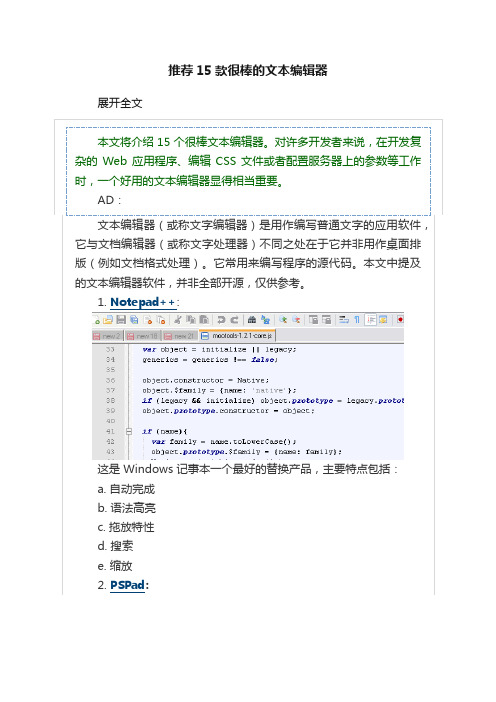
推荐15款很棒的文本编辑器展开全文1. Notepad++:这是 Windows 记事本一个最好的替换产品,主要特点包括:PSPad 是一个Windows平台上免费的适合程序员使用的编辑器。
它可以让你保持上一次编辑状态,这样在你下次打开编辑器的时候可以直接显示原来的文件。
此外它还支持通过FTP进行远程编辑,支持多文件的比较等。
a. 语法高亮b. 支持多文档编辑c. 内建 FTP 客户端d. 完整的十六进制编辑器e. 桌面会话保存3. Komodo:Komodo IDE可以在 Windows、Mac OS X 和 Linux 上运行,并支持通用的开源语言—— Perl、PHP 和 Ruby。
代码智能引擎非常可靠。
它扫描所有语言安装找到定制扩展,比如PEAR 模块。
在项目方面,它支持与 CVS、Subversion 和 Perforce 的集成,也允许直接向服务器 FTP 传递代码。
主要特点:a. 代码折叠b. 即时语法检查c. 支持多种语言d. 跨平台支持:Windows, Linux and Mac4. Coda:只支持 Mac 平台的文本编辑器,主要特点:a. 语法高亮b.行数计算c. 自动完成d. 自动保存代码片段5. Vim:Vim是从 vi 发展出来的一个文本编辑器。
代码补完、编译及错误跳转等方便编程的功能特别丰富,在程序员中被广泛使用。
和Emacs并列成为类Unix系统用户最喜欢的编辑器。
6. TextMate:Mac 平台下一款强大的文本编辑器,主要特性:a. 代码自动完成b. 可直接在文档中运行 SHELL 命令c. 支持多种风格d. 支持宏e. 目前已提供 Windows 版本7. TotalEdit:Windows 下的免费编辑器,功能:a. 语法高亮b. 文件浏览器c. 拼写检查d. 扩展工具集成e. 环境定制8. Gedit:这是Linux 下的一个纯文本编辑器,但你也可以把它用来当成是一个集成开发环境(IDE), 它会根据不同的语言高亮显现关键字和标识符。
高级程序员最爱用的8款代码编辑器

高级程序员最爱用的8款代码编辑器,你用哪几个?对于开发人员来说,利用一款好用的代码编辑器,可以起到事半功倍的作用。
本人归纳整理了开发人员比较常用的8款代码编辑器,希望大家喜欢!这里推荐 8 个编辑器:1. Adobe Dreamweaver CC使用 Dreamweaver CC,您可以快速轻松地设计、编码和发布在任何尺寸的屏幕上都赏心悦目的网站和 Web 应用程序。
2.AtomAtom 是github专门为程序员推出的一个跨平台文本编辑器。
具有简洁和直观的图形用户界面,并有很多有趣的特点:支持CSS,HTML,JavaScript等网页编程语言。
它支持宏,自动完成分屏功能,集成了文件管理器。
3.Sublime TextSublime Text 是一个文本前端的学习都是需要不断的学习,学一天停一停相当于白学,学习效果很差,如果你想有人一起学习可以来这个扣裙,首先是132 中间是667最后是127 都是零基础的同学,大家相互鼓励共同努力只是学着玩就不建议来了!!!编辑器(收费软件,可以无限期试用,但是会有激活提示弹窗),同时也是一个先进的代码编辑器。
Sublime Text是由程序员Jon Skinner于2008年1月份所开发出来,它最初被设计为一个具有丰富扩展功能的Vim。
4.BracketsBrackets自带强大的插件系统,先已有近百个插件,对nodejs, python, ruby, PHP, Rust等前后端语言都支持非常好。
虽然是打着Web开发,从各种插件来看,Brackets的野心是不小的。
5.WebStorm 116.Notepad++Notepad++ 是一款免费开源的跨平台的代码编辑器,基于GPL许可证。
它支持包括中文在内的多国语言,功能强大,除了可以用来制作一般的纯文字说明文件,也十分适合当作撰写电脑程序的编辑器。
Notepad++不仅可以实现语法高亮显示,也有语法折叠功能,并且支持宏以及扩充基本功能的外挂模组。
简单文本编辑器-设计报告
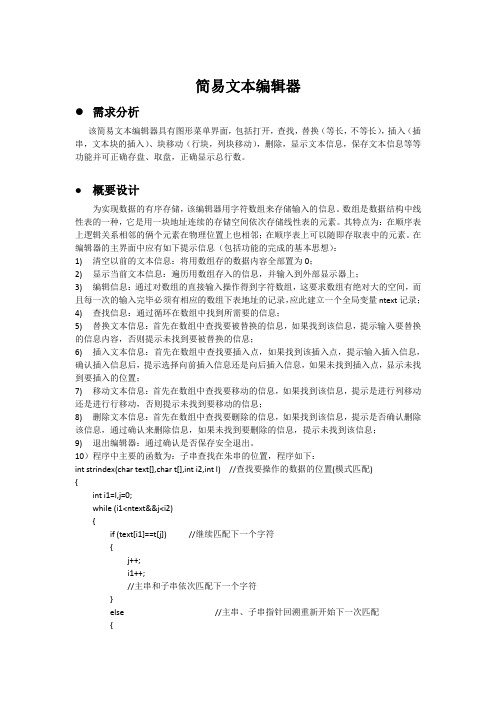
简易文本编辑器●需求分析该简易文本编辑器具有图形菜单界面,包括打开,查找,替换(等长,不等长),插入(插串,文本块的插入)、块移动(行块,列块移动),删除,显示文本信息,保存文本信息等等功能并可正确存盘、取盘,正确显示总行数。
●概要设计为实现数据的有序存储,该编辑器用字符数组来存储输入的信息。
数组是数据结构中线性表的一种,它是用一块地址连续的存储空间依次存储线性表的元素。
其特点为:在顺序表上逻辑关系相邻的俩个元素在物理位置上也相邻;在顺序表上可以随即存取表中的元素。
在编辑器的主界面中应有如下提示信息(包括功能的完成的基本思想):1) 清空以前的文本信息:将用数组存的数据内容全部置为0;2) 显示当前文本信息:遍历用数组存入的信息,并输入到外部显示器上;3) 编辑信息:通过对数组的直接输入操作得到字符数组,这要求数组有绝对大的空间,而且每一次的输入完毕必须有相应的数组下表地址的记录,应此建立一个全局变量ntext记录;4) 查找信息:通过循环在数组中找到所需要的信息;5) 替换文本信息:首先在数组中查找要被替换的信息,如果找到该信息,提示输入要替换的信息内容,否则提示未找到要被替换的信息;6) 插入文本信息:首先在数组中查找要插入点,如果找到该插入点,提示输入插入信息,确认插入信息后,提示选择向前插入信息还是向后插入信息,如果未找到插入点,显示未找到要插入的位置;7) 移动文本信息:首先在数组中查找要移动的信息,如果找到该信息,提示是进行列移动还是进行行移动,否则提示未找到要移动的信息;8) 删除文本信息:首先在数组中查找要删除的信息,如果找到该信息,提示是否确认删除该信息,通过确认来删除信息,如果未找到要删除的信息,提示未找到该信息;9) 退出编辑器:通过确认是否保存安全退出。
10)程序中主要的函数为:子串查找在朱串的位置,程序如下:int strindex(char text[],char t[],int i2,int l) //查找要操作的数据的位置(模式匹配){int i1=l,j=0;while (i1<ntext&&j<i2){if (text[i1]==t[j]) //继续匹配下一个字符{j++;i1++;//主串和子串依次匹配下一个字符}else //主串、子串指针回溯重新开始下一次匹配{i1=i1-j+1; //主串从下一个位置开始匹配j=0;//子串从头开始匹配}}if (j>=i2){return(i1-i2);} //返回匹配的第一个字符的下标elsereturn(-1); //模式匹配不成功}详细设计1.包括的头文件#include "stdafx.h"#include <stdio.h>#include <stdlib.h>#include <time.h>#include <string.h>#define MAX 10000#define _CRT_SECURE_NO_DEPRECATE //在vs中取消warning的警告2.相关函数原型void menu();void shuru(char text[]);void bc(char text[]);void dakai(char text[]);void dayin(char text[]);void chazhao(char text[],int l);void tihan(char text[],int l);int strindex(char text[],char t[],int i2,int l);void shanchu(char p[],int l);void cs(char text[]);void charu(char text[],int l);void tuichu(int status);char text[MAX]=""; //文本编辑域char name[20]=""; //文件保存的位置int status=0; //显示是否保存过的状态int ntext; //文本编辑的位置3./*打开文件模块*/void dakai(char text[]){system("cls");FILE *fp;char pd,ch;char name[30];int i=0;printf("输入A:确定打开文件(未保存的数据将会丢失) M:返回主菜单");fflush(stdin);pd=getchar();if (pd=='A'||pd=='a'){printf("请输入要打开文件名字(例如c:\\a.txt)");scanf("%s",name);while ((fp=fopen(name,"r"))==NULL){printf("\n打开文件失败,请重新输入要打开的文件名:");scanf("%s",name);}cs(text);while(!feof(fp)){ch=fgetc(fp);text[i]=ch;i++;}text[i]='\0';ntext=i;fclose(fp);printf("\n文件读取成功\n文件内容为\n");dayin(text);}if (pd=='M'||pd=='m')menu();}4./*保存模块*/void bc(char text[]){system("cls");FILE *fp;char pd;char tmp;int i;printf("\n输入【A】保存;任意键返回主菜单不保存\n");fflush(stdin);pd=getchar();if (!(pd=='A'||pd=='a')){menu();}else{if(name[20]==NULL){printf("\n请输入保存文件名(例如: c:\\a.txt):");scanf("%s",name);}while ((fp=fopen(name,"w+"))==NULL){printf("文件不存在,请重新输入文件名:");scanf("%s",name);}printf("\nA:确定;B:取消:");while(scanf("%c",&tmp)!=EOF){if (tmp=='A' || tmp=='a'){for(i=0;i<ntext;i++)fprintf(fp,"%c",text[i]);fclose(fp);status=1;printf("\n文件保存成功\n");break;}if (tmp=='B' || tmp=='b'){break;}}}}5./*初始化模块*/void cs(char text[]){int i;for (i=0;i<ntext;i++){text[i]='\0';}ntext=0;status=0;}int strindex(char text[],char t[],int i2,int l) //查找要操作的数据的位置(模式匹配) {int i1=l,j=0;while (i1<ntext&&j<i2){if (text[i1]==t[j]) //继续匹配下一个字符{j++;i1++;//主串和子串依次匹配下一个字符}else //主串、子串指针回溯重新开始下一次匹配{i1=i1-j+1; //主串从下一个位置开始匹配j=0;//子串从头开始匹配}}if (j>=i2){return(i1-i2);} //返回匹配的第一个字符的下标elsereturn(-1); //模式匹配不成功}6./*菜单显示模块*/void menu(){system("cls");time_t timep;time (&timep);printf("%s",ctime(&timep));printf("\n\n\n\n\n\n\n\n\n\t\t\tWelcom to use our TXT edition system!\n");printf("\n\n\t\t\t 欢迎您使用文本编辑器软件!\n");printf("\n\n\n\n\n\n\n\n\npress Enter to continue...\n");getchar();loop:system("cls");printf("\n\n\n\n\t\t******************简易文本编辑器*****************\n\n");printf("\t\t\t\t----0.清空内容--\n");printf("\t\t\t\t----1.打开文件--\n");if (ntext==0){printf("\t\t\t\t----2.输入内容--\n");}else {printf("\t\t\t\t----2.继续输入--\n");}printf("\t\t\t\t----3.查找------\n");printf("\t\t\t\t----4.插入------\n");printf("\t\t\t\t----5.删除------\n");printf("\t\t\t\t----6.替换------\n");printf("\t\t\t\t----7.显示内容--\n");printf("\t\t\t\t----8.保存------\n");printf("\t\t\t\t----9.退出------\n");printf("\n\t\t*********************选项************************\n");printf("\n\t\t\t\t输入选项0-9:");char n;fflush(stdin);n=getchar();if(n>='0'&&n<='9'){switch (n){case '0': cs(text);break;case '1': dakai(text);break;case '2': shuru(text);break;case '3': chazhao(text,0);break;case '4': charu(text,1);break;case '5': shanchu(text,0);break;case '6': tihan(text,0);break;case '7': dayin(text);break;case '8': bc(text);break;case '9': tuichu(status);default : break;}}else{printf("\n输入有误,请重新输入:");fflush(stdin);n=getchar();}system("pause");goto loop;}7./*查找*/void chazhao(char text[],int l){system("cls");int i,t,a=-1;char pattern[20],bd,pd;printf("原文为:\n");dayin(text);printf("请输入您要查找的内容");scanf("%s",pattern);printf("您查找的内容是:%s\n",pattern);t=strlen(pattern);loop:a=strindex(text,pattern,t,l);if (a!=-1){l=a+t;}int hs=1,ls=0;for (i=0;i<=a;i++){ls++;if (text[i]=='\n'){hs++;ls=0;}}if (a==-1){printf("查找到结尾没有找到\n输入【R】将重头查找;任意键返回主菜单");l=0;fflush(stdin);pd=getchar();}else{printf("已经找到在第%d行第%d列,输入【R】继续查找下一处;任意键返回主菜单",hs,ls);fflush(stdin);bd=getchar();if (bd=='R'||bd=='r')goto loop;}if (pd=='R'||pd=='r'){l=0;chazhao(text,l);}}8./*显示模块*/void dayin(char text[]){system("cls");printf("现在文本的内容为:\n");printf("%s\n",text);int hs=1,i;for (i=0;i<ntext;i++){if (text[i]=='\n'){hs++;}}printf("\n文本共有%d行\n",hs);}9./*输入模块*/void shuru(char text[]){system("cls");printf("请输入内容(输入@结束输入并返回主菜单):\n");printf("%s",text);char c;int i=ntext,j=ntext;fflush(stdin);while ((c=getchar())!='@'){text[i]=c;i++;ntext=i;continue;}int cout=0,zf=0,h=1,hs=1,zfs=0;for(;cout<ntext;cout++){zf++;if(text[cout]=='\n'){h++;zf--;}if(text[cout]==' ')zf--;}for(cout=j;cout<ntext;cout++){zfs++;if(text[cout]=='\n'){hs++;zfs--;}if(text[cout]==' ')zfs--;}printf("统计:文本一共有%d个字符,%d行,本次输入了%d个字符,%d行\n",zf,h,zfs,hs);}10./*删除*/void shanchu(char p[],int l){int i,a=-1,t2=0;char x[20],px,pd,pdx,c;system("cls");printf("%s",p);printf("\n输入【A】执行查找删除内容;任意键返回主菜单:");fflush(stdin);px=getchar();if (px=='a'||px=='A'){printf("\n输入您要删除的内容,以@结束:");fflush(stdin);while ((c=getchar())!='@'){if (c=='@'){break;}else{x[t2]=c;t2++;continue;}}loop:a=strindex(p,x,t2,l);int hs=1,ls=0;for (i=0;i<=a;i++){ls++;if (p[i]=='\n'){hs++; ls=0;}}if (a==-1){printf("已查找结束,您要删除的内容不存在\n输入【R】重新输入要删除的内容;其他键将返回主菜单:");l=0;fflush(stdin);pdx=getchar();}else{printf("你要删除的内容在第%d行第%d列\n 输入【A】确定删除;输入【B】寻找下个词;其他键将返回主菜单:",hs,ls);fflush(stdin);pd=getchar();l=t2+a;if (pd=='a'||pd=='A'){for(i=a;i<ntext;i++){p[i]=p[i+t2];}ntext=ntext-t2;printf("删除成功,删除后的内容为:\n%s\n",text);}else if (pd=='b'||pd=='B')goto loop;}if(pdx=='r'||pdx=='R')shanchu(text,l);}}11./*插入*/void charu(char text[],int l) //向文本中插入内容{system("cls");int i=0,t=0,t2=0,a=-1,b;char cr[20]="",pd,x[500],c,d;printf("\n当前文本信息为:\n");printf("%s",text);printf("\n输入您要在哪个内容前插入,以@结束:");fflush(stdin);while ((c=getchar())!='@') //用一个数组接收要插入在哪个内容之前{if (c=='@'){break;}else{cr[t]=c;t++;continue;}}loop:a=strindex(text,cr,t,l); //查找并返回要插入的位置点int hs=1,ls=0;for (b=0;b<a;b++){ls++;if (text[b]=='\n'){hs++;ls=0;}}if (a==-1){printf("\n查找到结尾没有找到插入点,输入【R】查找其他;按其他键返回菜单:\n");l=0;fflush(stdin);d=getchar();fflush(stdin);}else{printf("\n您要插入的位置是第%d行,第%d列之前\n【A】.不是此位置向后继续找插入点\n【B】.在此位置插入\n按其他键返回菜单\n请选择:",hs,ls+1);fflush(stdin);pd=getchar();if (pd=='a'||pd=='A'){l=a+t;goto loop;}else if (pd=='b'||pd=='B'){printf("\n\n输入您要插入的内容,以@结束:");fflush(stdin);while ((c=getchar())!='@'){if (c=='@'){break;}else{x[t2]=c;t2++;continue;}}for (i=ntext;i>=a;i--){text[i+t2]=text[i];}for (i=0;i<t2;i++){text[i+a]=x[i];}ntext=ntext+t2;printf("\n当前文本信息为:\n");for (i=0;i<=ntext-1;i++)printf("%c",text[i]);printf("\n文本插入成功\n");fflush(stdin);getchar();}}if (d=='r'||d=='R'){l=0;charu(text,l);}status=0;}12./*替换*/void tihan(char p[],int l) //内容替换{int t=0,t1=0,i,a,b;char c,th[20],d,d1,bth[20];int i2;system("cls");printf("\n当前文本信息为:\n");for (i2=0;i2<=ntext-1;i2++)printf("%c",p[i2]);printf("\n输入要被替换的内容,以@结束:");fflush(stdin);while ((c=getchar())!='@') //t指替换前内容的长度{if (c=='@'){break;}else{bth[t]=c;t++;continue;}}loop:a=strindex(p,bth,t,l); //查找要被替换的内容的位置int hs=1,ls=0;for (b=0;b<a;b++){ls++;if (p[b]=='\n'){hs++;ls=0;}}if (a==-1){printf("\n查找到结尾没有找到要被替换的内容\n输入【R】查找其他内容,按其他键返回主菜单键\n");l=0;d=getchar();fflush(stdin);}else{printf("\n\n已经找到要查找的数据在第%d行第%d列\n输入【A】继续向后查找相同内容\n输入其他键将进行替换操作\n请选择:",hs,ls+1);fflush(stdin);l=t+a;char pd;pd=getchar();if (pd!='a'&&pd!='A'){printf("\n是否要替换该内容?\nA:替换给内容;其他键返回主菜单\n请选择:");fflush(stdin);d1=getchar();if (d1=='a'||d1=='A'){printf("\n输入要替换的内容,以@结束:");fflush(stdin);while ((c=getchar())!='@') //t1指替换后的内容长度{if (c=='@'){break;}else{th[t1]=c;t1++;continue;}}if (t==t1) //将要被替换的内容和替换后的内容进行长度比较{for (i=0;i<t1;i++)p[i+a]=th[i];}else{if (t>t1){for (i=0;i<t1;i++){p[i+a]=th[i];}for (i=a+t1;i<ntext;i++){p[i]=p[i+t-t1];}ntext=ntext+t1-t;}else{for (i=ntext;i>=a;i--){p[i+t1-t]=p[i];}for (i=0;i<t1;i++){p[i+a]=th[i];}ntext=ntext+t1-t;}}printf("替换成功");printf("\n当前文本信息为:\n");for (i2=0;i2<=ntext-1;i2++)printf("%c",p[i2]);getchar();status=0;}}elsegoto loop;}if(d=='r'||d=='R')tihan(text,l);}13./*退出*/void tuichu(int status){char pd;if(status)exit(0);elseprintf("还未保存文件,确定退出?(Q.直接退出;Y.保存后退出");fflush(stdin);pd=getchar();if(!(pd=='Q'||pd=='q'))bc(text);exit(0);}int main(){menu();return (0);}调试分析1.界面设计2.界面设计2主界面的设计如图,比较单调。
Quill—心目中的最佳富文本编辑器

Quill—⼼⽬中的最佳富⽂本编辑器Quill—⼼⽬中的最佳富⽂本编辑器由于长时间使⽤ UEditor 编辑器,再加上 UEditor 界⾯实在不够清新,不符合我的审美,遂决定给⽹站后台换⼀个富⽂本编辑器,经过⼏天的寻找以及试⽤,终于找到了符合我这强迫症的最完美的编辑器,它就是——Quill。
⼏⼤编辑器⽐较UEditor这款编辑器应该很多⼈都⽤过吧,说实话,它的功能在我看来是最全⾯、最强⼤的,不仅包含丰富的⽂本样式编辑,还有强⼤的表格编辑功能,插⼊功能,⽽且接⼊⼗分简单,可惜的是官⽅早就不再更新了,所以样式看起来不那么“主流”,不过这个就见仁见智了,并不影响它成为⼀款优秀的富⽂本编辑器。
Simditor这款编辑器满⾜基本的需求,但插件不是很多,样式⽐较清新好看,对于我来说少了字体颜⾊的设置,代码⾼亮也不甚理想,要求不⾼的可以使⽤这款。
wangEditor这款编辑器是国内⼀个开发者开源的,功能基本⾜够,样式主流,但⽂档中说明了“从编辑器中获取的 html 代码是不包含任何样式的纯html”,就是说需要⾃⼰编写样式,但相对来说灵活多变,可以⾃⼰实现多⽪肤功能CKEditor这款也算中规中矩吧,有基本功能,但看了⼀圈还是没有我需要的字体颜⾊跟代码⾼亮功能,但值得⼀提的是,它有⾏内编辑功能,编辑内容更加直观,仿佛是在编辑⽹页⼀样,这个功能还是挺强⼤的。
TinyMCE这款编辑器很漂亮,功能也⾮常多,编辑出的⽂章样式也⼗分美观,代码⾼亮功能实现的也可以,但它却是我最不喜欢的⼀款,因为我觉得它太重了,类似于word的菜单功能虽多,但隐藏较深,操作步骤变多,这很影响编辑⽂章的速度以及注意⼒,当然最常⽤的⼏个功能还是显式,所以就见仁见智吧。
Froala这款被很多⼈称为史上最NB的编辑器,的确它功能强⼤,插件丰富,可⾃定义主题和插件,我简单使⽤了⼀下,没有我需要的代码⾼亮,所以果断放弃,或许它可以⾃定义配置,但我没有深究。
- 1、下载文档前请自行甄别文档内容的完整性,平台不提供额外的编辑、内容补充、找答案等附加服务。
- 2、"仅部分预览"的文档,不可在线预览部分如存在完整性等问题,可反馈申请退款(可完整预览的文档不适用该条件!)。
- 3、如文档侵犯您的权益,请联系客服反馈,我们会尽快为您处理(人工客服工作时间:9:00-18:30)。
int CreatStringFromFile( String** S , char* filePath ) ; // 从文件建立字符串
int StringLength( String* S ) ; // 求串长
int StringCompare( String* S1 , String* S2 ) ; // 串比较
InitalizeStringInformation( &S , 1 ) ;
InitalizeStringInformation( &Source , 1 ) ;
system( "color 1E" ) ;
do
{
system( "cls" ) ;
void SaveToFile( String* S , char* filePath ) ; // 保存字符串到文件
void DestroyString( String** S ) ; // 串销毁
void DestroyIndex( Index** subIndex ) ; // 子串索引销毁
printf( "\t*%55c\n" , '*' ) ;
printf( "\t*-*-*-*-*-*-*-*-*-*-*-*-*-*--*-*-*-*-*-*-*-*-*-*-*-*-*-*\n" ) ;
printf( "\n请输入一个自然数并按 \"Enter\" 键以执行相应操作 : " ) ;
printf( "Designed by Wind Fantasy\n" ) ;
printf( "\n\t*-*-*-*-*-*-*-*-*-*-*-*-< 菜单 >-*-*-*-*-*-*-*-*-*-*-*-*\n" ) ;
printf( "\t*%55c\n" , '*' ) ;
// 字符串处理扩展函数 :
int SubStringIndexAll( String* S , String* subS , Index** subIndex ) ;// 查找子串所有索引
// 广义字符串替换:第一个函数替换特定子串 , 第二个函数替换所有子串 , 替换串为NULL时 , 视为删除
int SubStringIndex( String* S , String* subS ) ; // 求子串在父串首次出现的位置
int StringInsert( String** S , int index , String* insertedString ) ; // 串插入
{
String* str ; // 链串首结点
int letters_count ; // 字母个数
int figures_count ; // 数字个数
printf( "\t%-9c%-38s%9c\n" , '*' , "10.保存对(文本)文件的修改 ;" , '*' ) ;
printf( "\t%-9c%-38s%9c\n" , '*' , "11.另存为(文本)文件 ;" , '*' ) ;
printf( "\t%-9c%-38s%9c\n" , '*' , "00.退出程序 ." , '*' ) ;
printf( "\t%-9c%-38s%9c\n" , '*' , "03.查看当前字符串 ;" , '*' ) ;
printf( "\t%-9c%-38s%9c\n" , '*' , "04.查看当前字符串的组成信息 ;" , '*' ) ;
printf( "\t%-9c%-38s%9c\n" , '*' , "05.查找指定位置开始的指定长度字符串 ;" , '*' ) ;
int characters_count ; // 总字符个数
} Stf struct _Index // 定义串索引结构
#include <stdio.h>
#include <malloc.h>
#include <conio.h>
#include <stdlib.h>
#define SUCCESS 1 // 定义操作成功的标志为SUCCESS
printf( "\t%-9c%-38s%9c\n" , '*' , "08.从当前字符串中删除指定的子字符串 ;" , '*' ) ;
printf( "\t%-9c%-38s%9c\n" , '*' , "09.替换当前字符串指定的子字符串 ;" , '*' ) ;
printf( "\t%-9c%-38s%9c\n" , '*' , "06.查找指定的字符串的位置 ;" , '*' ) ;
printf( "\t%-9c%-38s%9c\n" , '*' , "07.在当前字符串指定的位置插入字符串 ;" , '*' ) ;
{
int sub_index ; // 子串在其父串的位置( 或索引 )
struct _Index* next_index ; // 指向子串的下一个串索引结构的指针
} Index ; // 串索引类型
void StringCopy( String** targetString , String* sourceString ) ; // 串拷贝
void SubString( String* S , int index , int subLength , String** subS ) ; // 子串提取
void PrintIndex( Index* subIndex ) ; // 子串的所有索引输出
void PrintStringInformation( StringInformation* SI ) ; // 串组成信息输出
Index* subIndex ;
char input[ 200 ] , cString[ 200 ] , filePath[ 200 ] = "" , anotherPath[ 200 ] = "" ;
int position , choice , succeed , subLength , count ;
int SubStringReplaceSingle( String** S , int index , String* subS , String* replaceSubS ) ;
int SubStringReplaceAll( String** S , String* subS , String* replaceSubS ) ;
printf( "\t%-9c%-38s%9c\n" , '*' , "01.读取(文本)文件建立新字符串 ;" , '*' ) ;
printf( "\t%-9c%-38s%9c\n" , '*' , "02.查看源(文本)文件内容和组成信息 ;" , '*' ) ;
int space_count ; // 空格个数
int endline_count ; // 换行符个数
int others_count ; // 其他字符个数
struct _String* next ; // 指向下一串结构的指针( 链域 )
} String ; // 串类型
typedef struct _StringInformation // 定义串信息结构
int SubStringDelete( String** S , int index , int subLength ) ; // 子串删除
void PrintString( String* S ) ; // 串输出
int main( )
{
StringInformation S , Source ;
String* newString = NULL , * replaceString = NULL , * subString , * tempString ;
gets( input ) ;
choice = StringToUnsignedInt( input , 11 ) ;
switch( choice )
{
case 1:
if( S.str != NULL )
{
printf( "已从文件中建立过字符串,是否要重新建立以替换原有字符串?\n" ) ;
printf( "\"是\"请输入y , \"否\"请输入其它字符串或不输入 : " ) ;
// 字符串操作基本函数及其他相关辅助函数 :
